#today I learned a valuable lesson about how UP and the card system work
Text



fun things to do during a power outage
#won't be fixed for another six hours they say#fallen london#flmp#smen#mp#today I learned a valuable lesson about how UP and the card system work#live and learn...or die and learn as the case may be
122 notes
·
View notes
Text
(TW: my catholic school trauma)
Reading “The Boy Who Could Change the World”
It’s difficult to even imagine what America was like before the industrial revolution. Their notion of freedom was far stronger than the one we have today. For many Americans, life wasn’t about showing up at a job at a specified hour, following orders all day, and returning home for a couple hours of “free time”—that would be considered slavery. A free American was one who worked on their own or with their family, worked from home, worked whatever hours they liked, and got paid based on what they accomplished.
Under the putting-out system, for example, merchants would deliver raw materials like cotton to your house. When you felt like it, you’d card, spin, and weave the raw cotton into cloth. And then the next week the merchant would come by to buy from you whatever cloth you had produced.
He goes on to discuss mill workers in New England, who were mostly young girls, some around the age of 10. This was before our modern day labor laws, so the girls were working fourteen hour days. They still found time to read & discuss books/ideas, though.
And through all that thinking and learning and discussing, they began to question the less pleasant aspects of their situation. When, in 1836, the Lowell mill owners decided to cut their employees’ pay, the girls walked out.
What these young girls accomplished is truly amazing. They organized their own newspaper, the Voice of Industry, which they wrote, edited, printed, and sold themselves. Through it they organized more protests and strikes, as well as organized their own slate of candidates in the state elections to fight for better working conditions and a ten-hour day. Amazingly, their slate won. The owners, outraged, got their legislators to declare the election results invalid and hold a revote. Before the revote, large signs were posted threatening that anyone who voted for the ten-hour slate would be fired. And yet the slate won again.
[..]
But their writing in the Voice shows that they wanted much more than simply better working conditions. They saw themselves as slaves—wage slaves—and concluded that the solution was not simply to demand that the bosses be nicer to them or pay them more, but to abolish the bosses entirely.
Their bosses didn't like this, at all. The mill owners fired the girls, blacklisted their names, and then did something strange: they sent girls to school.
The schools they built—the common schools—would be easily recognizable by any modern student. “The door [of each school] shall be closed precisely at the time fixed for the opening of the school, and in the morning religious exercises will be performed, for which purpose 10 minutes are allowed.” (Today we just say the pledge of allegiance.) “Each teacher shall call the roll call of his or her classes … in the morning and afternoon, and shall keep an accurate record of all absences.” The day was then divided into separate lessons, allowing “30 minutes for the study of each lesson and 10 minutes for each recitation.”
Instead of corporal punishment, teachers were encouraged to secure order “by the mildest possible means” to instill “a regard for right, and thus a standard of self-government in the minds of the children themselves.”* Students were tested on how much they learned and, just like today, working coordinating other students was considered “cheating” and punished. (Perhaps they were worried that if students learned to coordinate they might be more likely to foment strikes once in the mills.)"
[...]
Careful records kept by the mill owners allow us to compare mill workers who did and did not go to school. Just as with modern students, there is no evidence of any impact of increased education on worker productivity.*
So why did the mill owners spend so much money building and running these schools? They were quite clear about their intent. The classes were justified not for their usefulness but because memorizing them was a form of “moral education” leading to “industrious habits … and the consequent high moral influence which it exerts upon society at large.”
As one Lowell manager explained it, “I have never considered mere knowledge, valuable as it is in itself to the laborer, as the only advantage derived from a good common-school education. I have uniformly found the better educated, as a class, possessing a higher and better state of morals, more orderly and respectful in their deportment, and more ready to comply with the wholesome and necessary regulations of an establishment.”"
As the Lowell School Committee summarized their findings: “The proprietors find the training of the schools admirably adapted to prepare the children for the labors of the mills.” Why? “When [their laborers] are well educated … controversies and strikes can never occur, nor can the minds of the masses be prejudiced by demagogues and controlled by temporary and factitious considerations.”*
Indeed, school was so important that the mill owners quickly decided to make it mandatory. “No language of ours can convey too strongly our sense of the dangers which wait us from [those who] are not and have never been members of our public schools,” warned the Lowell School Committee. Universal schooling is “our surest safety against internal commotions.”‡
The children who didn’t attend school “constitute an army more to be feared than war, pestilence and famine,” warned the committee. “Unsuccessful attempts, during the past year, to burn two of our school-houses … are an index to the evils which threaten from such sources.”
More accurately, such burnings were an index of public resistance to such coercion. In 1837, 300 teachers were forced to flee their classrooms by riotous and violent students.║ In 1844, the Irish population went on strike from the schools, reducing attendance by 80%. The School Committee stepped up their anti-truancy efforts to force them and others back to school."
And so the spread of schools and factories destroys the American model of freedom. Instead of being independent farmers or self-employed manufacturers, Americans are herded into factories enmasse, forced to work for someone else because they cannot earn a living any other way. But thanks to schools, this seems normal, even natural. After all, isn’t that just the way the world works?
The effect on the students is almost heartbreaking. Taught that reading is simply about searching contrived stories for particular “text features,” they learn to hate reading. Taught that answering questions is simply about cycling through the multiple-choice answers to find the most plausible ones, they begin to stop thinking altogether and just spout random combinations of test buzzwords whenever they’re asked a question. “The joy of finding things out” is banished from the classroom. Testing is in session.”
School hasn’t seemed to have changed much since the early 1800s, at least the not sort of schooling geared for the masses. As a child, I was strongly discouraged from risk taking, ridiculed by teachers when I gave the wrong answer, punished for asking questions, had to ask permission to use the bathroom (and was often refused), refused permission to get a drink of water (the school had no air conditioning & it was June in Pennsylvania. Yes, multiple children got heat exhaustion, daily. Our parents commiserated, but thought this was normal. Teachers treated this as normal. We were told to “toughen up” and respect our elders when we complained.) We were taught to need someone’s permission to get medical attention.
I was once refused when I needed to see the nurse (I was going to vomit.) The teacher accused me of lying & told me to sit down. I sat down, and about two minutes later threw up. I half expected to get a demerit for dirtying the floor. I burst into tears, blubbering out humiliated apologies to my classmates and to the teacher. Above my concern for my dignity and health had been placed my teacher. That was my mentality as a kid.
(Normal is whatever you’re used to, but people shouldn’t be used to this.)
The thing that stands out in all of this, now, was how the other students remained frozen. I don’t know how to interpret their freeze -- they didn’t move to get me a tissue, or towels, or anything. The teacher had forbade me from moving to clean up myself, so I had to wait for the nurse to arrive in a puddle of my own vomit. I obeyed. My classmates were staring at their desks, at the wall, anywhere but the teacher or myself. Maybe they were suffering second-hand embarrassment, or pity, or even fear that the teacher would lash out at them, next.
That was the sort of environment we grew up in, for 14 years of our lives.
In all of this, I notice this kind of moral fragmentation that society today seems to encourage. There’s a sense that people have abrogated all responsibility: “oh, that’s not my department, I’m not the one who makes the rules.” So we ignore people in pain, and accept on an instinctive level that there’s nothing we can do.
Except that isn’t true, even that asshole Lowell said, “The children who didn’t attend school “constitute an army more to be feared than war, pestilence and famine.””
This submissive attitude people have comes from fear, from an underestimation of our own strength and compassion.
---
Like, do people get what this does to a person’s self-esteem? Maybe not, because they’re all suffering from the same blindness.
Last week during the heat wave, I started experiencing heat exhaustion and my instinctive thoughts were to move as little as possible, and wait for it to be over.
I mean, what does that sound like to you?
Like, maybe my experiences at school were unusually bad, but it looks to me a lot like our society is systematically abusing kids into submissively accepting poor treatment by their superiors.
778 notes
·
View notes
Text
Solve the World Ep. 1: Meet Jennifer Dash
What you're about to begin is an epic. It's an epic because it features the conquest of the impossible. Full of myths and legends, from microbiology to Minotaurs, from the depths of evil to the heights of possibility. Starting now, and for the next 100 episodes, we'll follow a young woman, as she follows her own intuition into the deepest mysteries of life. Why are we here? What are we supposed to do? How's it all gonna end? Have patience, dear listener. What begins with a whimper, won't end that way. This is not a story about a quiet life of desperation. No, no, this is Homer's Odyssey, Dante's Divine Comedy, Jennifer Dash's quest. Welcome, and brace yourself. It's a bumpy ride.
[Winding, a child sings in a foreign language, a bell tolls]
Solve the World, Episode 1: Meet Jennifer Dash
[Deep, echoing bell toll, the child sings again]
Let me present to you Jennifer Dash. Seventeen years of age, 5'9", dirty blonde hair that falls just to the small of the back, undeniably pretty. But the type of pretty that doesn't stand out in a crowd. Her charm is as such that in one moment she could easily pass for a tall fourteen-year-old, and then the next pull off that college grad look. You would like her immediately if you met her. And you should, Jennifer Dash is a wonderful human being, full of youthful exuberance, naïve charisma, childish glee, and a curiosity that could rival Nikola Tesla.
Today she is wearing an orange shirt, cut-offs, and seventeen dollars wadded up in her pocket, and, as is her style, she sports knee-high socks with matching coloured sketchers. But we get ahead of ourselves. We really do hope you like her. You're stuck with her now, you're stuck with her for quite a while. This is how it goes.
[Thunder cracks]
Awoken by a sound, perhaps a distant thunder, Jennifer became aware that she didn't understand life. She got up, grabbed her favourite old, mouldy black backpack, and pushed open the front screen door, letting it slam on her rear on the way out.
Okay, let's pause right there. We want everything to go well here. The beginning of an adventure, it's gotta hook you, it's gotta get you involved. How is that best communicated? What could possibly draw you into this massive journey, led by a young girl none of us know. It's a daunting task. Focus. Focus on Jenn. She's the valuable one here. She's worth the risk, worth the hours and hours and years spent with her. She's the girl for you.
And she knew, even then, walking out that door, that this understanding of life, it's not the same as figuring out one's own purpose in life or the cliché phrase "I'm going to find myself", none of that business, no. Jenn somehow understood the fallacy of searching for her own special purpose or destiny or whatever you want to call it. To do so would to center all of human history around herself. And that, friends, seemed quite far-fetched to our young protagonist. That's part of what makes Jenn interesting, what makes her unique, and precious in our eyes. For a teenager to see beyond herself like that, in this modern age of distraction? Who does that?
So again, Jenn pushed upon that screen door, uncaring as it slammed her on the rear on the way out. Off. Off to solve the world, somehow. As Jenn walked those first few steps past her door, she began to reason that she needed some sort of system of organisation. She would acquire data, lots and lots of data. Surely one needed facts and figures in order to categorise and therefore digest the world as a whole. But how on earth was she to organise all that stuff the world had to offer? While submerged in these throws of contemplation, Jenn reached the neighbours mail box. She stopped, stared at it, and with little hesitation, opened the box, taking the mail along with her. And so she walked, away from her past, away from her home turf, away from that screen door with someone else's mail in hand.
"But what am I walking toward?" Jenn pondered. There was no sidewalk on this street so she instinctively followed the dotted line in the middle of the road. Perhaps, if she had seen the movie, Jenn would have blurted out, "Follow the yellow brick road!" But alas, she was blithely unaware of that story. So she continued along the dotted line free of any analogous musical melody. What Jenn did think in that moment, as she perused her recently-acquired stolen mail, was this:
"Ok, so, a system. How to devise a system. Perhaps the mail has some insight for me. Mail... mail... mail... how did I come to know this as mail? Somewhere in time, someone taught me about the postal service. And therefore, I assume these papery items found in certain flagged boxes were deliver by men from various far-off lands. And I called this mail. Hmm, I see it now, oh it's so clear! Up until this moment, up until this dotted line, I've built my life upon stolen information. I trusted that this mail service was real, based on the word of others. Why should I accept that information? There! That's a starting point: no belief without direct experience! Ok, ok ok ok. But I shouldn't become a doubter of others. I don't wanna be a skeptic. So... I'll believe the experiences of others, but not their second-hand knowledge. Again, that's a starting point something to build from, a base. Only accept experience as data, or the first-hand experience of others I choose to trust. If I'm to believe that this paper in my hands is mail, then I must meet, someone who delivers the mail and can vouch for the mail system. Or as a second option of intake, I must myself become a mailperson in order to fully embrace the idea of mail. But as far as I know, I haven't met a mailman that I trust. So logically then, I can't accept this mail as mail! Wonderful, Jenn! You're getting it, old girl! I shall call these papers in my hand that I picked out of the box with a metal flag on it: Humphaliandra!"
[Bell tolls]
At that thought, Jenn suddenly held out the mail with both her hands and announced to anyone in earshot, "Hello, humphaliandra! Pleasure to meet you! Pleasure to hold you in my hands like so!" Jenn thought "But wait, I can call this humphiliandra all I want but that doesn't negate my memory. I still know this as mail. I've just given it a new name, but it's still mail. I can't simply erase what I've learned." It came to her then in a flash, in one word: MYTH. Jenn reaslised then that of course she couldn't undo 17 years of life education. She couldn't un-mail the mail. But what she could do, is recatagorise it. Mail became, in an instant, along with all the other lessons Jenn had been taught, a myth. There was data and there was myth. Data was humphiliandra, myth was mail. That's just how it was. Jenn thought, "Ok old girl, everything you've been taught is myth. Everything you've learned from experience is data useful to solve the world. I don't need to write it down, these are commandments to be memorised. This is important. This is vital. What I wanna talk about the process of sending and receiving papers of information using the postal service, I refer to these things as the myth of mail. It remains myth because I have no way, at this time, to be sure that this system of delivery works as I have been told. Therefore: myth. When I simply want to refer to the papers that have appeared inside metal boxes with flags, I refer to humphiliandra, which of course, being observed from my own experience, is not myth but solid-as-a-rock data."
As Jenn now strolled down the center of the street, she sighed. Pleased with herself that after merely traveling a few paces down the road, she'd already grown so wise, and made such dramatic inroads into solving the world. Not knowing where to take her mind next, she drew her attention away from her new-found commandments to the humphiliandra in her hands. A bill from a credit card company, due payment of $174.71, addressed to Red Jeb Heller. "Red Jeb", what a funny name. Address: 300 Room St, Jennings, Louisiana, 70546. Also included in the loot was a Macy's catalogue. Flipping through, the Halloween section caught her eye. Page 67 had a little boy in an astronaut costume. On his left chest, his blue jumpsuit showed off a big ol' NASA insignia stitched in.
Jenn thought, "NASA... When was I first taught that men had walked on the moon? Can't remember. Seems like a fact of life. Every American child is taught their ABC's, their 123's, and that Neil Armstrong, Buzz Aldrin, and that other guy went to the moon in 1969, officially showing the Russians that capitalism is awesomer than communism. It sure showed them! Look at how Humpty Dumpty's walls fell down, ha! But why should I believe that story? How can I count this as data, as something I know to be true? Maybe the Russians tell their people that they got there first. Maybe they call it Soviet Moon. Or Moon Union. For that matter, how do I know that Russia exists? Never been there. Have I met anyone who's been there? Eh, kibbles and bits, it's too hard to remember the past. New commandment I declare: only people I meet from this moment on count in this hunt to solve the world. Let the past lie down and sleep a while. Who cares for it anyway. Can't help me now. So there's a myth of man going to the moon and a myth of Russians, and Russia. Just like, as I see now on pages 70 and 71, there is a myth of vampires and a myth of zombies. I should treat all these ideas as equal, all things are myth and I need to prove them, one way or the other in order to treat them as data.
A third envelope contained a hand-written letter. It read:
"Hi Red, how are you? I'm okay. You haven't come over lately, have you? Why is that? Is it me? Are you ignoring me, or just the world in general? Yesterday they voted off Tony. I know, crazy. These are treacherous times we live in, old man. You just can't trust people to make the right decisions anymore. Isn't that right? See, you're rubbing off on me, even when you're not around. This pessimism thing, it's kinda cute actually. I miss you. Is it the communists? Has your paranoia grown? You can be honest with me about that stuff. You know that, right? I'm trustworthy. And reliable. Well, perhaps not so reliable, but yknow, I'm trustworthy with secrets and stuff. Even if the Reds-"
Note the plural rather than the honourable singular form of the word.
"Even if the Reds were to bang down my door and torture me for 47 hours straight with voodoo and Chinese water torture, I'd still never give those scumbags your inner deep thoughts. Besides, even if I wanted to tell someone something, who would I tell? I'm not well connec-"
Jennifer Dash turned her gaze mid-sentence from the paper in hand to a bird whistling in a nearby pine tree. Her mind was on the Russians. She thought, "Commies are on everybody's minds, I guess. Even the Macy's catalog! Why else would they have those big, bad, NASA emblems on the outer space outfits? I'll tell you why, old girl. They wanted the whole world to know they're selling good old-fashioned capitalist American astronautic gear, rather than cosmonaut corduroys. Cosmonauts and astronauts, funny words. Two more myths to ponder. I'm hungry."
Jenn stopped walking. Two simultaneous thoughts vied for control of her will. She was dreadfully hungry, and she was well aware that not eating led to bad, bad paths of dark doom. Jenn certainly didn't want dark and doom, she wanted light, bright, and free. Therefore, her body required sustenance. Nevertheless, she had a mission at hand; to solve the world, and the world wasn't about to just solve itself. And at this particular moment, she found herself entering into the first deep debate her adventure would lead her on.
As she continues down the road, to nearly endless physical wonders, this mental quandary will continue to rear it's ugly head. We shall ask this question now, knowing that Jenn won't come to a peaceful conclusion today. Many of Jenn's upcoming perils will be from physical attacks and strange occurrences. This mental moment, however, provides a subtle uncertainty that will continue to lie as a herrang??? for Hennifer and perhaps, for you. The question is this: Can the written word, now read, be included as data, or is it relegated to myth? The Halloween costume of the young astronaut brought this question to stunning reality for Jenn. Does the picture of the boy validate the existence of that costume? Can she trust that picture? What tools does she have to reach a consensus within herself? This small question instantly multiplied and divided itself into thousands of individual quagmires. Jenn pictured vast walls full of books, books full of stories of days gone by, experiments tried, battles fought, knowledge won. But can they be trusted? Any of them? Jennifer was overwhelmed. She took a big breath, and recited aloud what she knew.
"I know I'm holding humphaliandra, also known to me as the myth of mail. I've learned about many myths in my past life. I accept none of them as truth as of yet. They're neither true nor false, they are merely ideas, yet to be realised to me. I see a picture of a boy in a space suit, I do not know whether to believe that he exists or not. I have seventeen dollars in my back pocket, and I am hungry. I will try to feed myself now, using the seventeen dollars as a bartering tool, as the myth of money teaches me. I am hungry, and I will be fed." Jennifer took another big breath, smiled, and started walking again. She saw a fast food shop in the distance. She would test the myth of money next.
Content with her new system, she named the question of books 'flagatorindor'. Jennifer Dash liked to name things. She would dispel the question of flagatorindor one way or the other, by venturing to Macy's in search of the costume. Then, she would hunt down a supposed mailman, and solve the myth of mail. But first, she would quiet her stomach. Food ahead.
Solve the World is produced by me, Dante Stack. I'd like to thank the many generous artists at (freesound.org) and (freemusicarchive.org) where I found all the music and sound effects for the show. Full attribution for those sound effects are located on my website at (dantestack.com/solvetheworld), under 'Show Notes'. If you like the show, then please, express your support and write a review on iTunes, that's the biggest way anyone can help out the show at this point in the game. Besides that, you can also join our Facebook group at (Facebook.com/solvetheworldpodcast). Also, if you're interested, check out my other podcast, 365 Honest Questions, which is on iTunes, Stitchr, or at my website (dantestack.com) Thanks!
Please, continue with us. Continue with Jenn Dash, as she builds off her humble beginnings and uses all her capacities to make sense out of this planet. Next time, Jenn gets more than she bargained for when she exchanges her back-pocket money for fast food, and what she hears just may, just might, lead her forward in her self-proclaimed destiny... to Solve the World.
3 notes
·
View notes
Text
SBWL (Sabaweli): To Tell You About My Campus

The end is gravely interesting. I begin from the end.
Excuse my ignorance but I hate the person who came with a methodology that students be tested on Tests and Exams so as to check if they are fit to proceed to the next level of their studies, Tautona who speaks Sepedi, Sesotho and Setswana fluently in a predominately Nguni area, cursing and moaning chatting to his girlfriend.
Epistemology. You see, you are now being a typical politician on campus. What is wrong with you? Why always use these big words mnganiwam? Daluxolo reprimanding his friend from Sekhukhuniland in Limpopo. Rumor says, that Tautona, is a product of parents who are witchdoctors since he is from Limpopo. Daluxolo always misrepresents Limpopo for ‘Limpompo’ yet he is the first to label Tautona a lekwerekwere because he speaks broken isiXhosa.
Often when they attend ceremonies, funerals and orphanages in Mthatha, Centane, Tsolo, Ntambankulu, Msombomvu, when Tautona is invited as a speaker, this idiotic moron from Bizana infamously known, as Daluxolo feel utterly embarrassed. For his friend sounds like as if he is lekwerekwere.
‘Epistemology, simply means,’ he would first clear his throat as if something is about to choke him: ‘ehhhh, that it is philosophy of knowledge.’ By know we should know everything that exists has a philosophy, even football does. Besides who said a word is a big word, if you don’t knoqw the meaning?
Daluxolo would raise an argument as if he is in a mass meeting, ‘don’t patronize me, you are a fanatic of bombastic words!’
‘Come on, if you don’t know a meaning of a word look it up in a dictionary, there is no such a thing as a big word,’ Tautona adds: ‘no matter the size of the word, for as long as you don’t know its meaning, then it is precisely a big word.’
This conversation between the two would go on and on to an extent where they would just attract a crowd playing pool in the tuckshop with curiosity. Rebuttals from Tautona who is an Africanist rejecting a fallacious usage of the word ‘lekwerekwere’ in a context that many Afrikan brothers and sisters were killed since ‘lekwerekwere’ is associated with a foreigner who is in South Afrika coming from Afrika. Europeans are arrogant, look how they have successfully divided and conquered us. In absentia we are killing each other defending their notorious colonial borders which are a consequence of their Berlin Conference of 1884. How dare we see a foreigner coming from the same motherland soil as all of us?
The end of everything that transpired on campus is remarkable and fascinating. For the first since 2016 Daluxolo has managed to get a minimum of 40% for all his modules thus he has DP and qualifies to exams for all his modules. For those who didn’t know what is DP it represents that you have ‘duly performed’ to write an Exam.
Their campus is very small with about 6708 registered students in 2019. It has exactly three Faculties: Engineering, Education and Business Management. Daluxolo is doing a BTech in Human Resources (HR). Tautona is totally disturbed to learn that for BTech there is a module called Research Methodology: whereby one is ridiculously expected to define what is research, its purpose after you have practically done the actually research. Decolonising a historically and presently ‘black university’ is doing away with such backwardness because it undermines the intellectual capacity of an Afrikan student.
Tautona, is residing on-campus at Block N. It is haunted by evil spirits, from Nigeria, the fellows from the room neighboring his once alleged. How those came remains a deeply miraculous untold narrative. Remarkably his residence has it all. From unashamedly and fully devoted bazalwane Christians, who are not afraid to daily worship the Father, the Son and Holy Spirit trice in a day. To those who consume liquor almost as if they want to commit suicide digging their graves thus beating God’s time when He will decide for them to die. Finally severally folks who are ‘politicians’ from commonly known major political student organizations on campus.
Quite depressing is that this block N is waterless. Other blocks on-campus do have water yet this block N seems to always run out of water. The result of this is disastrous: the students and Aunty who works there suffers. For students, is when they want to shower, to cook and take a shit. For Aunty who cleans is often confronted by toilets where people took a shit without flushing. Or on Mondays when she cleans and there is just no water. Thanks God for our wonderful sweety-pie all in the name of green tank outside who is our savior as far a water is concerned.
Daluxolo has a five-60 at block A. He is terrified by black cats often he does question how the SRC and University managers are planning on removing that black cat at the bathroom of that residence. Frankly it was one Azania Azania who traumatized Daluxolo that the black cat has now little kittens when she recently posted on Facebook. She dropped it hilariously, little she knew, she out rightly nearly drove Daluxolo to comma. Since he is from Bizana he is forced to ‘man-up’ because we live in an aggressive patriarchal society. And certainly he does not want to seem effeminate for fearing cats.
‘I will draw the computer, mouse, case, keyword,’ continued an Indian lecturer: ‘I want to demonstrate something, I am sorry you are studying Information Technology (IT) without any computers.’ This drives Tautona furiously insane. He does not even have a laptop for that matter. Even if he did, it would have been ineffective for the lecturer would not give special treatment to him. Relatively students here come from poor background and there enemy is the class struggle. He was informed that computers were last bought in 2010 and were never replace. Moreover, as a result, over the years’ students have decided to be thugs and steal mouse’s, cables, keyboards and the like.
The beginning. Eish, my younger sister is here for walkings-in. I pleaded with her to apply last year and she only applied for NSFAS. Now I have no option but make sure she is part of this multitudes who want to enter in the system. But it seems like Mafoko took valuable lessons from the Head of ICT Mr Selwane. They are here to shot. I see us being wounded by bullets today. Yeah neh! Damn being an Afrikan student you always get shot at, even for demanding a right to access education?
‘Registration is a mess today Daluxolo,’ asserted Tautona.
‘Well I feel like the campus shutdown is inevitable,’ he responded.
‘No, no, no, they must wait. I am targeting EMS for my younger sister.’
‘Oh yes, I heard students are being admitted there, quickly rush’.
On campus there is not even water, there is a threat that Student Affairs is threatening to prohibit special cases to allow students without paying a cent. The SRC or Interim SRC must never mislead students. The political power here on campus rests with political formations, not SRC or certainly individuals in SRC. Daluxolo, ‘if they don’t unite for the betterment of an Afrikan child then they will become victims of University managers’. Mnganiwam, ‘I heard that the reason SRC Elections did not take place last year is because one person stopped them!’ Tautona jiggled.
‘Don’t be a fool, or are you ignorant?’
‘Well……….’
Daluxolo interjects: ‘We have no messiah here in our campus.’ Annoyingly he continues: ‘SRC Elections did not happen because the new imposed SRC Constitution was rejected and Student Affairs could not find a company to run elections in Butterworth after IEC chickened out on them’.
‘But you are making sense, how could elections be stopped by one person?’
The leadership of the Interim SRC is then calling a mass meeting. Wow. My younger sister is taken at EMS for Education. Let me ring mama. ‘Hello mama, it is very tough, I got her inside but they want R300 immediately’. Yes, I got old-lady today. She is stingy like an HOD of IT who failed dismally to give students a braai in Durban for their Academic Tour though it was part of the trip, now I will pocket R800 remember R500 is my personal allowance she promised me. In addition, I am ready to discuss at the mass meeting today and eventually argue we need mass action. I really do not have registration fee and I do not qualify for NSFAS because of N+2.
For Daluxolo and Tautona are an epitome of violence from a society whereby egalitarianism exists on paper in the Constitution of the Republic of South Africa not pragmatically. In their campus they spend their academic life in protest demanding basic things like water and lecturers which are compulsory for teaching and learning. More time spend in the national road N2 then being in class. Moreover, protesting for meal allowances because hunger is their biggest enemy.
Now Engineering is threatened to be taken away from campus. Education tried its tricks with PGCE, but apparently, the matter is resolved. However, now that ABET is replaced by Foundation Phase, why BEd for Technical and EMS is not uploaded online for next year on applications? ‘Remember also in Accounting we won’t have BTech for Auditing and CMA since they are now replaced by Advance Diploma,’ concludes Daluxolo almost as if he is a god of thinking.
Allowing a government that is ideologically bankrupted to bring about meaningful progress in academia is a hopeless dream.
It is Friday night. The music from Chesa is too loud. Daluxolo and Tautona are funded today by NSFAS ingenile imali ya bafundi. They have all bought groceries now it is time for socialization with the youth, the energetic and vibrant people. Mingling is fundamentally fundamental.
‘I feel intoxicated now…can we go?’
Daluxolo tipsy retorting: ‘let us walk with other students.’
‘Why is that so mnganiwam? I am not afraid of amapharaphara!’
Just last week they took a phone, bank cards and a pair takkies from this other boy from block J. He was pretty much brutalized and couldn’t stop cursing.
‘You are drunk wena Tautona, I ain’t risking anything,’ an anxious Daluxolo.
‘Okey…oke, I will go dance with that girl akere you are a shumane yourself Daluxolo.’
The residence disky gusha tournament is continuing. We are also have seen people who can easily make it to PSL and salvage the sinking ship of the Happy People, Orlando Pirates, but unfortunately they are disadvantaged by where they are based. These players are just marvelous to watch for playing this beautiful game so exceptionally.
‘We won a gusha,’ excitedly remarks Tautona, almost as if he was a player.
Finally he is done with Exams but going to Limpopo it is too soon. He is planning to go to Bizana with Daluxolo in end of November. He knows very well that there is an injury of Wi-Fi in the rural shanty village of Limpopo and more home chores since he is the only man in the family after his father disappeared in the big city of lights. Stalling perhaps is a necessity.
Both Tautona and Daluxolo are tested in their trials and tribulations and will not rest until they are proud graduates of their campus. It has significantly mold and shaped their thinking. Success is a must and the only way out. It does not matter how long it takes them, nobody knows their story but quitting is not an option.
0 notes
Photo

New Post has been published on https://lovehaswonangelnumbers.org/energetic-navigation-28-october-3-november/
Energetic Navigation 28 October – 3 November
Energetic Navigation 28 October – 3 November
By A Gift From Gaia
Progressively speeding up as we move deeper into the Solar Minimum and yet we have barely begun, the energy we find ourselves in is transforming those consciously aware rapidly, moving through realisations and releases almost hourly compared to how it was not so long ago when “things” would take “time”, of course, we realise that the “time” we took was again part of what required releasing and by releasing the lower aspects of this energy spectrum, the weighted time of the human linear way, it became Divine Time which simply showed the love within the energy, the light, and offers perfection in every moment. To exist in Divine Time is to be in a space of complete surrender, it’s a space where judgement would be self-sacrificing and defense creates internal wounds, Divine Time is the higher conscious view of Saturns playing ground and once you acknowledge our Lord and the rules on the gate he will gift you with the most magical experience as you release the restrictions of the lower octave programming we came to accept and be ruled by.
Breaking Free is a theme of energy that we have been surfing all this year, releasing from the Devil Tarot Card that represents the Capricorn energy, but as we know the Devil represents the low octaves of the human, the machine, the blind and so to use the old unconscious ways of the fear spectrum such as defense and judgment, blame and shame allows those loose chains to remain in place, those chains are not fixed, they are easily removed and so the choice to remain has always been yours.
The resistance creates disharmony, release brings magical celestial harmonics and with these Mars square Saturn and Pluto transits that are now reactivated for the next couple of weeks, the Mars square Saturn lined up yesterday and the Mars square Pluto is heading in now, we are continuing to learn how to ride this wild stallion, although perhaps some have mistakenly picked up the wild bull as it went charging past, see that’s a little different energy, the stallion holds heart, he can be tamed, the bull on the other hand doesn’t seem to hold the ability to connect, has no care, just wants to charge his angry self into every obstruction, and will eventually burn out his energy and most likely refuse to move for quite some time.
Both patterns, both rides are super important, those choosing the charging bull will no doubt learn to catch a ride with the stallion next time around and by that phase the chances are the bull will have allowed you to observe why you chose him, that the walls you had built up around, caked in unconscious belief systems posters and flyers to keep the truth of the wall hidden behind pretty dreamy pictures and fluff dressed in pity MUST come down.
This energy however you choose to move through is evolving us, taking us on lightspeed travels, zipping parts of our minds back into our ancient self, to retrieve data required for the now, and yet the next minute we are travelling with the ancient future self to receive the confirmation because the gems being retrieved are often beyond imagination and require boosts to fully understand the resonance and the codes held.
This means MORE raising of the physical body vibration, more listening to its requirements and acting in the moment as opposed to the old ways of waiting/weighting, which only ever slows us down, ignoring the most subtle signs of the body, even so much as making the request for thirst or hunger dissolve and opting for avoidance tactics signals to the body a lack of interest, a lack of unconditional love, there will be no self healing until EVERYTHING the body says is understood and innerstood, meaning we act upon everything, in the NOW because the now is the space in which we choose, now is The Creator of the ever evolving you.
This Mars energy we are experiencing is such a powerful clearing and creative energy if you understand how it behaves, and once that is understood we realise it is simply our own energy, emanating out from within and using the power of creation to highlight where our creation is not in harmony with our highest aligned timeline, and he is showing us the wounded masculine in its process of healing, as he is hot on the heels of the feminine, Venus, who is just one step ahead, Mars is focused, he is heading out of the underworld where he has been hidden behind the sun and he is now making the most out of this journey, fully aligned, fully committed to begin to unify with the feminine, the wounded masculine within is ready to support, ready to place his energy where it matters, within, to show his Queen her value, the true twin flame within, is ready to merge and become One very powerful light force energy.
What makes this more magical is that Saturn holds no expectation and the lesson is to realise it is the motion that matters, holding the awareness and making steady positive steps, in fact any speed or idea of rushing, pushing or charging ahead will only create an experience to understand patience, and again to step back into the flow of Divine Time allowing this to form so it can show you all the magical light gems along the way, and we don’t want to miss a single one, every light gem is so ridiculously valuable especially during this Dark Moon energy we have been surfing leading into todays Scorpio New Moon, which is opposing Uranus in Taurus, there is the bull again and he is acting rather jumpy with Uranus on his back, taking random turns, bucking and spinning, this is pure expect the unexpected energy, and for the cosmic surfers this is likely to bring a whole heap of new ideas and ways to underpin the new physical body vibrational upgrades you have been focusing on, this is something I noticed just a couple of days ago as myself and Reese, my son, have been adding some rather new and interesting things to our diets to assist on his road to recovery.
I would also like to just say a massive thank you to everyone who has been donating and sharing our fund, you have all encouraged him MORE than I could have imagined as he is now listening and open to trying natural ways to heal himself, a few days ago he would refuse ALL, didn’t believe anything would work other than the meds, we have so many new things and we are sharing them together, and yarrow tea seems to be quite a favourite. We had so many messages and a whole list of things to try which I read out to him, and talked to him about and just that, just by those messages of love from you all out there has helped him open up to receive and try more things to support this disease.
We do have an awfully long road ahead of us though and we will still require some extra support as I am paying privately for Hydrotherapy sessions and so if these energetic navigation reports assistance you in anyway could I please ask for a small donation to the Help My Son Walk Again fund I have set up on GoFundMe (link below), however if you would rather donate through Paypal please do so using the email address – [email protected] or hit the link paypal.me/agiftfromgaia
What has been interesting to See in this is that there is a reflection of weakness, whilst I don’t have Ankylosing Spondylitis I have become aware we do have weakness in the same area which is why we are now healing this as One body, he is afterall a future version of myself, his template was created during times of dis-ease and of course this becomes the baseline frequency of his genetic makeup, so it makes sense we do this together.
But what this experience has been showing is exactly how this all works, how when you release all fear and restriction, when you listen to the requests of the body, when you care more, when you prioritise Self and plug only into that which nourishes, which incorporates all feeds that enter the field, then the experience becomes nothing short of enlightening and therefore rapid, the moment you release the push and the need what transpires is the flip, the rise and the expansion into new healthFULL experiences and by using the signposts being delivered by our celestial map it becomes an incredibly INjoyable transition.
The Scorpio New Moon energy takes us in deep, it allows so much to be seen and released to begin yet another transformative week that sees us welcoming in the backwards dance of Mercury in Retrograde, we are dredging the pool of Scorpio, we are digging away at the bottom and there will no doubt be more data to be found as ancient relics are unearthed giving us yet more clues as to why we find ourselves here and from these clues we will soon realise new paths opening up for us to journey.
This Mercury Retrograde is coupled with a solar wind prediction, we await the codes heading in and I will be back to translate.
Stay present in the heart angels and open into pure acceptance for how the guidance moves us.
Please place a 💙 in the comment box to keep the heartbeat of A Gift from Gaia alive in the body of Facebook and please share the post or invite those you feel will resonate to this space, one small action can change the entire dynamics of a reality, you may just be turning on the light for someone lost in the dark.
Here is the GoFundMe page to support my son Reese and his healing, it is essential we get him walking now as we are already facing irreversible damage.
gf.me/u/v8gqjy
Thank you All 💙💙💙
*****
LoveHasWon.org is a Non-Profit Charity, Heartfully Associated with the “World Blessing Church Trust” for the Benefit of Mother Earth
Share Our Messages with Love and Gratitude
LOVE US @ MeWe mewe.com/join/lovehaswon
Visit Our Online Store for Higher Consciousness Products and Tools: LoveHasWon Essentials
http://lovehaswonessentials.org/
Visit Our NEW Sister Site: LoveHasWon Angel Numbers
https://lovehaswonangelnumbers.org/
Commentary from The First Contact Ground Crew 5dSpiritual Healing Team:
Feel Blocked, Drained, Fatigued, Restless, Nausea, Achy, Ready to Give Up? We Can Help! We are preparing everyone for a Full Planetary Ascension, and provide you with the tools and techniques to assist you Home Into The Light. The First Contact Ground Crew Team, Will Help to Get You Ready For Ascension which is Underway. New Spiritual Sessions have now been created for an Entire Family, including the Crystal Children; Group Family Healing & Therapy. We have just began these and they are incredible. Highly recommend for any families struggling together in these times of intense changes. Email: [email protected] for more information or to schedule an emergency spiritual session. We can Assist You into Awakening into 5d Reality, where your experience is one of Constant Joy, Wholeness of Being, Whole Health, Balanced, Happy and Abundant. Lets DO THIS! Schedule Your Session Below by following the Link! Visit: http://www.lovehaswon.org/awaken-to-5d/
Introducing our New LoveHasWon Twin Flame Spiritual Intuitive Ascension Session. Visit the link below:
https://lovehaswon.org/lovehaswon-twin-flame-spiritual-intuitive-ascension-session/
Request an Astonishing Personal Ascension Assessment Report or Astrology Reading, visit the link below for more information:
https://lovehaswon.org/lovehaswon-ascension-assessment-report
https://lovehaswon.org/lovehaswon-astrology/
Experiencing DeAscension Symptoms, Energy Blockages, Disease and more? Book a Holistic Healing Session
https://lovehaswon.org/lovehaswon-holistic-healing-session/
To read our Testimonials you can follow this link: http://www.lovehaswon.org/testimonials
Connect with MotherGod~Mother of All Creation on Skype @ mothergoddess8
Request a copy of our Book: The Tree of Life ~ Light of The Immortals Book
Order a copy of Our LoveHasWon Ascension Guide: https://lovehaswon.org/lovehaswon-ascension-guide/
**If you do not have a Paypal account, click on the button below:
If you wish to donate and receive a Tax Receipt, click the button below:
Donate with Paypal
Use Cash App with Our code and we’ll each get $5! FKMPGLH
Cash App Tag: $lovehaswon1111
Cash App
Donate with Venmo
VENMO
Support Our cause in the creation of the Crystal Schools for Children. Visit our fundraising link below:
LoveHasWon Charity for Crystal Schools
Support Our Charity in Co~Creating the New Earth Together by Helping Mother of All Creation. Visit our fundraising link below:
Support Mother Earth!
Support Us on PATREON
PATREON
Support Us Through Our LoveHasWon Wish List
LoveHasWon Wish List
We also accept Western Union and Moneygram. You may send an email to [email protected] for more information.
***If you wish to send Donations by mail or other methods, email us at [email protected] or [email protected]***
**** We Do Not Refund Donations****
MeWe ~ Youtube ~ Facebook ~ Apple News ~ Linkedin ~ Twitter ~ Tumblr ~ GAB ~ Minds ~ Google+ ~ Medium ~ StumbleUpon ~ Reddit ~ Informed Planet ~ Steemit ~ SocialClub ~ BlogLovin ~ Flipboard ~ Pinterest ~ Instagram ~ Snapchat
0 notes
Text
HMD's Nokia 7.2 could be the new mid-range smartphone to beat


The Nokia 7.1 was a fan-favorite, so a sequel was all but inevitable — what's more surprising is just how ambitious it is. HMD just pulled back the curtain on the Nokia 7.2 at IFA in Berlin today, and if nothing else, it's a clear sign that the Finnish company is aiming for the top of the mid-range smartphone pack.
To do that, HMD focused its efforts on two main areas: The phone's display and its cameras. (You know, the stuff you were probably going to use most often anyway.) This year's 7.2 packs a noticeably bigger screen than the 7.1 — think 6.3-inches, up from around 5.8 — but the quality of the display might be even more valuable than the extra real estate it provides. It's as crisp as you'd expect a Full HD+ screen to be, and its color reproduction seemed quite nice right out of the box. That was true even when I moved around the demo room and into different lighting conditions, thanks to an ambient light sensor that automatically tunes the display's color temperature depending on your surroundings.
More importantly, HMD also worked in a dedicated Pixelworks display to processor help to upscale videos to HDR on the fly. Does a roughly $350 phone really need HDR support? Arguably no, but I'm still pleased HMD found a way to make it work in a device this inexpensive.

As nice as this screen is, though, the Nokia 7.2's camera system is the real draw here. HMD likes to say it's the first Nokia phone with a triple camera around back, and while it's not nearly as crazy as the five-camera setup used in the Nokia 9 PureView, the 7.2 is arguably a better all-around performer. A 48-megapixel sensor will handle most of the heavy lifting, and if you really wanted to, you could snap photos at that full resolution all day long. You'd be better off shooting in the default 12-megapixel mode, though, since it combines multiple pixels on the sensor into one for improved clarity and low-light performance.
Beyond that, HMD also ran with an 8-megapixel wide camera that can capture 118 degrees of whatever's in front of it, and a depth sensor for more satisfying portraits. Add some Zeiss optics and we're ultimately left with a camera that, during our limited time together, felt surprisingly good for the price.
I couldn't smuggle many sample photos out of my briefing, but I can't not share this anecdote: While there with a few other reviewers, I snapped a quick photo of a good friend just to see what the camera was capable of. Upon reviewing the results, we found the 7.2 had rendered his well-lit face with such clarity that it was almost sort of a buzzkill. "When did we get old?," he asked me. I don't know, buddy. I just don't know.
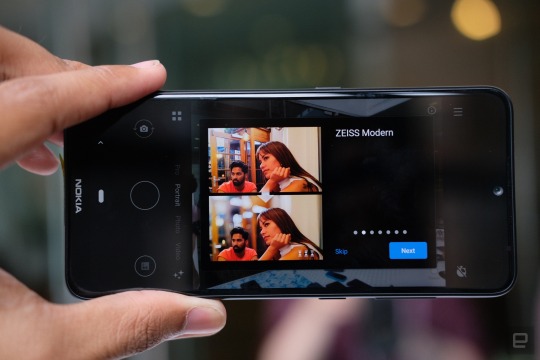
The biggest lesson HMD seemed to learn from the Nokia 9 PureView was about the value of good software. It's non-negotiable. Thankfully, the handful of additional camera software tricks here seem pretty helpful. HMD says it partnered with Zeiss to recreate the signature bokeh characteristics of some old-timey lenses to give portraits an extra dose of photo-nerd flair. And while I haven't tried it yet — our meeting was in the middle of the afternoon — the 7.2's Night Mode is meant to combine up to 20 frames in low light into a single, improved Night shot.
The rest of the 7.2 is no slouch either: There's a Snapdragon 660 inside, along with 4GB of RAM, which is more than enough to make the clean, Android One-certified version of Android Pie fly. The phone also packs 128GB of internal storage (which you can augment with microSD cards as large as 512GB), and a 3,500mAh battery. I half-wish HMD ran with a bigger battery here, but considering the price tag and the features involved, I guess they had to save money somewhere.
Thankfully, HMD did a fine job crafting a body to fit around these components. There frame here is made of polycarbonate sandwiched between panes of Gorilla Glass, and the phone's back features a sort of satin-y, light-diffusing finish that gives the whole package a more premium look than you'd expect from a phone that costs this much. Oh, and word to the wise: If you're even considering buying this phone (which you probably should), strongly consider the cyan green color way. It's reminiscent of the Ocean Depths Essential phone from a few years back, and it's just stunning. I doubt my photos are doing it any justice.
If for whatever reason the 7.2 is a bit too much phone for you, Nokia has crafted a backup plan of sorts. This year's Nokia 6.2 essentially recycles the 7.2's screen and body (albeit with some less swanky materials) but uses a 16-megapixel sensor as the centerpiece of its triple camera system. The Snapdragon 636 inside didn't run noticeably slower than the slightly improved chipset in the 7.2, thankfully, and the rest of the spec sheet is largely the same. That's not bad when you consider that the Nokia 6.2 is expected to sell for about €210 ($230), but after playing with the 7.2 for just a bit, it definitely seems worth the splurge for the camera alone.
- Repost from: engadget Post
0 notes
Text
Week 5
chapter 10: ICT
In 2009, I graduated from high school. Computers were used in school when learning how to type but we did not have laptops or tablets. I went to a public school so perhaps it was a financial issue for why we did not use these technologies in the classroom or maybe it was because the teachers were not trained in how to integrate them into the curriculum. Excel, Powerpoint, and Microsoft Word were used as the staple tools but now students as well as teachers have access to hundreds of platforms. The site toptools4learning.com lists the current helpful resources which I will definitely be utilising for my classroom lessons. If my previous teachers had used links such as Padlet, Powtoon or Socrative there is a high chance I and my fellow classmates would have been more engaged.
Information and Communication Technologies relates to any type of technological tool which captures, stores and exchanges information. ICTs are believed to improve education, improve learning and improve access to jobs and information (Churchill, 2016). These tools will assist with higher-order thinking; only using textbooks and direct-teaching methods do not promote diversity in the way students learn. Interactive Whiteboards, E-Readers, and Flipped Classroom are different types of ICT applications currently being used in school settings today. ICTs will prepare our children for the future and will adapt them for change. Technology is used throughout my day. To start, my iPhone alarm wakes me up for work. On my way to the bus stop I put in my Apple AirPods to FaceTime my parents who are halfway around the world. Then I tap onto the bus with my Opal Card which is linked to my account online. At work, I clock-in using my fingerprint which is connected to the companies database. My daily tasks involves using a system called Opera and during the day different departments communicate with each other via Skype. Technology has positively influenced industries and there will continue to be innovations for productivity in the future.
With the few lessons I have planned, I had incorporated Ted Ed videos for discussions but after stumbling upon http://splash.abc.net.au/home I consider this to be another valuable resource. The site includes podcasts, videos and games that I can use in Geography and History. To test it out, I played the game ‘Diminishing fish stocks: three points of view’ which can be used in a year 9 Geography class. At the beginning it asks for your opinion whether protecting jobs is more important than protecting the environment. Then it asks you if you want to explore other points of view or if you want to stick with your initial choice. This activity caters to many multiple intelligences and would be best used for an individual task. For Business Studies, www.scootle.edu.au will help me immensely as it breaks down the Australian Curriculum by year with the general capability and cross-curriculum priorities for lesson planning ideas. This website will be beneficial for me during my practicums or when I start casual teaching next year.
Personally, I do not believe that students should be able to bring their own devices to school. High school is a time where students are able to perfect their handwriting during the school day like when note taking. From my own experience, kids in a high pressured environment like high school can bully other kids from those who have and have not. If the cool kids all have Apple laptops and some kids have Dell or other brands then this has potential to cause conflict in the classroom. I would not even say only upperclassmen are allowed to bring their own devices because this again establishes a social status. If schools want students to have tablets or laptops then the school should provide those devices. My concern with devices in the classroom is that they pose too much of a distraction for students. Certain websites like Facebook and Twitter may be blocked but it is not hard for students to figure out ways around the restrictions like using VPN’s. I was not supposed to text in school yet I still did it. Also, there may be the possibility that so many students using the wireless connection will result in an overload of the network (Nierengarten, 2018).
Students bringing their own devices (BYOD) do bring positive vibes into classrooms in a variety of ways. It is a more cost effective way from the school’s perspective and students are not held accountable for schools property. If they lose their own device, it is not the schools responsibility. With having laptops or tablets it offers a chance for eBooks to be used instead of physical textbooks. I hated bringing all of my textbooks home everyday because my backpack was so heavy causing my back and shoulders to ache. Schools will be able to say money if eBooks are available instead of hardcopies. However, if I was to say to the classroom, ‘read The Crucible on your tablet for the next 30 minutes’ there would be no way for me to monitor that they were actually reading the play or whether they were reading the latest article from E! News. There is also the issue of having the devices charged; what was once going to be an individual task will turn into group work if more than one students device battery is zero percent. Now there is potential for a student to download a virus but this would be an extreme con with BYOD into the classroom (Arney, 2015).
In summary, Information Communication Technology tools have positive and negative impacts in the classroom. The majority of sources are used to benefit the student in their learning ability but there is the possibility of ICTs having a negative affect on the child. It is job as educators to ensure students are able to access information in this digital age. Students may think that their devices are best used for communicating with their peers but ICT has revolutionised the way we educate students (Prakashbhai, 2013).
Arney, L. (2015). Go Blended! A Handbook for Blending Technology in Schools. San Francisco, CA: John Wiley & Sons, Inc.
Churchill, R. (2016). Teaching: Making a Difference (Third ed.). Milton, Queensland: John Wiley & Sons Australia, Ltd.
Nierengarten, Mary B. (2018). “Positives and negatives of digital media for children: The intrusion of digital media into the lives of children is causing concern for parents about how best to guide use of this omnipresent technology.” Contemporary Pediatrics. Pp. 12. Retrieved from:
http://link.galegroup.com.ezproxy2.acu.edu.au/apps/doc/A570123841/AONE?u=acuni&sid=AONE&xid=ddbbf5a8.
Prakashbhai Bosamia, M. (2013). “Positive and Negative Impacts of Information and Communication Technology in our Everyday Life.” Disciplinary and Interdisciplinary Approaches to Knowledge Creation in Higher Education. Maharaja Krishnakumarsinhji Bhavnagar University.
0 notes
Text
THE DUCK AVENGER PK2: #7 ONE MORE DAY

This is the issue for those who have yet to realize that the Ducklair Family Civil War hurts people! It’s also a very interesting look at that fact.
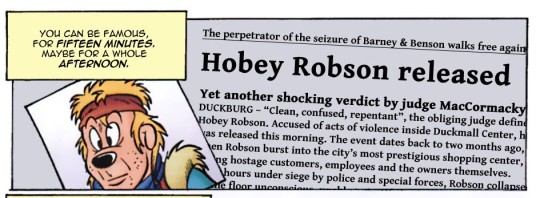
“Clean.” Guess Hobey’s off the drugs. Mid-rape is a terrible way to do it though, 0/10 would not recommend.
Our friend Hobey is sleeping in the park, having a nightmare, while the narration boxes ominously talk about things going back to normal, IF something haven’t changed you in the meantime. Unfortunately for Hobey, he had an unstable, psychic woman scramble his brains for a while, so he’s started hearing voices.

Other hobo know where this is going :(
Later, the Avenger is once again trying to figure out Everett’s mysterious antennas. He’s brought tools, and the first one, a meter, apparently registers zero voltage. Which seems odd for such a large installation.
Meanwhile, Everett is being Everett. Vaguely creepy and kind of a dick.
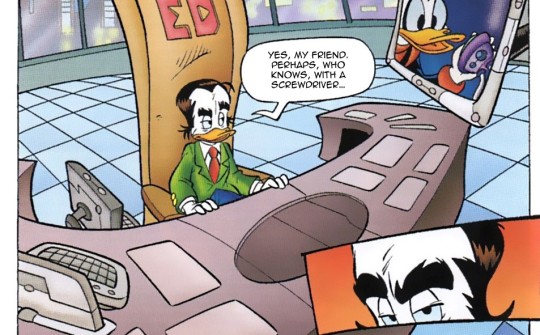
GET A HOBBY!
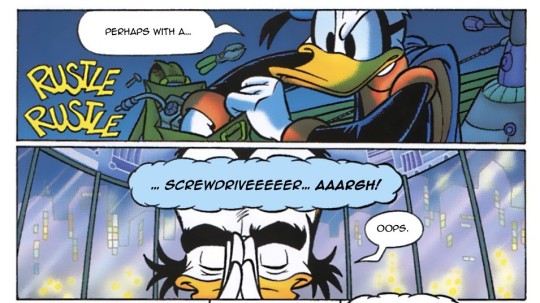
This is so amazingly, hilariously petty, I keep re-reading it just to laugh.
The Avenger jokes to himself, thinking it only, that the antennas might be microwave ovens, and Everett decides he doesn’t need to worry about the Avenger.
That wouldn’t be a problem at all if you hadn’t behaved an idiot, but okay, sure.
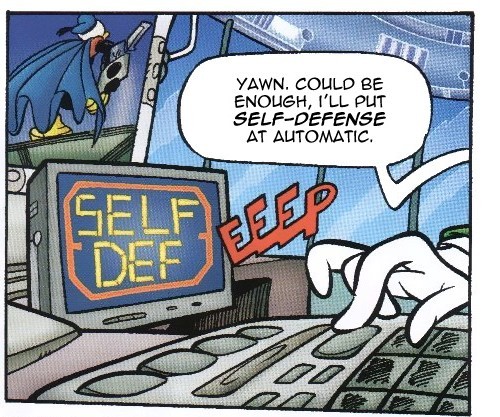
Time for the robot-instects of DOOM.
The Avenger is immediately blasted down onto the street below. Where he meets Hobey. This meeting goes nowhere this time, as the Avenger realizes he’s late for work and has to run.
He shows up half an hour late, and this time the boss isn’t buying his lies. Understandable, as Donald is covered in soot, but claims he had problems with the water heater. Show up on time, or else! Is the message this time.
Which is fair, really, but it still sucks.
And then it’s time for a flashback to Hobey’s past. We find him in an office, where he’s busy getting fired. Not for doing a bad job or anything, it’s just hard times and people with more technical skillsets are more valuable than the creative types at the moment.
Hobey decides this is bullshit and decides to sue. This goes… well, we all know where we first met Hobey.
And now he’s started to hear voices.

Aw, Hobey, no.
At work, Rupert has taken pity on Donald and sent him off to “patrol” the sofa department. Rupert himself however, gets stuck cleaning up a vaguely alive failure in the frozen food department, as Stella goes looking for Donald. Finding him asleep, she start talking about Feng Shui and something called Iridology, which is apparently reading of the eyes. She does correctly diagnose him with stress, stress and more stress.
This is when Rupert arrives and gets jealous. Donald tries to explain it’s nothing, but Rupert walks of muttering about people who can read eyes and people who can read thoughts.
Pretty sure there’s only one of those around this issue, and it’s not Donald.
Stella makes one last suggestion to what might be causing Donald stress, and accidentally strikes gold: The antennas might be the problem.
And a lightbulb switches on for Donald. What if the antennas are psychic? Or rather, what if the antennas are designed to sense the intentions of the people around them, in order to protect themselves?
Considering who made them, that’s a really good guess.
With this working theory, the Avenger gives it another try, this time thinking positive thoughts!
It works, right until the Avenger lets his mind wander to the actual task at hand, disassembling the antennas, and the one he’s working on explodes.

Shield’s getting a workout today.
Elsewhere, some technicians who were supposed to be working on a different antenna get told to go and fix the one that exploded. Exactly how they’re going to do that, considering that size of the explosion…
But before that they have a different problem. Hobey is asleep right next to their antenna. And what do you know, head technician recognizes him! Roger, as he’s named, quit their old company right before it shut down and started working for Ducklair Enterprises again.
Hobey gets some satisfaction out of those news, and Roger offers him breakfast too. And then, joy of joys, Hobey realizes the voices are gone! For about five seconds, and then the antenna gets turned back on.
Hobey asks Roger if he can hear the voices, and Roger, thinking Hobey’s gone screwey, offers him his card, so he can call if he needs help. Hobey accepts, but tells Roger that he’s not as screwey as he thinks.
So psychic powers are infectious. Who’d have thought?
Actually... *glances at One*
I mean, it could be that Hobey had some latent telepathic ability that Korinna woke up, we know there are other humans with psychic powers. But I kinda like the idea that this is a thing? Because I seriously doubt One was programmed with telepathy, but assuming prolonged contact with the Ducklair’s family brand of telepathy messes with someone’s head in a specific way...
It’s an out there theory, I know, but I’m keeping it.
While Hobey is having his little revelation, Angus Fangus is going to try and dig up some dirt on Everett. Who is in a meeting with his top people, so he’ll have to wait a bit.
Those top people are Birgit Q, Anymore Boring and Lyla. The main point of the meeting is the Everett want to ensure that everyone gets that the image of the corporation is very important right now. The competition is worried about how this might upset the market, the suppliers are worried about new demand, the customers are just worried apparently.
Lyla, in addition to her actual job also gets to be responsible for Juniper. Not sure that’s normal, but considering that the entire cast have changed, not adding yet another person is probably a good idea, yeah.
Lyla thinks Juniper is doing fine, being a sweet and sensitive girl. Everett thinks she’s a bit too sensitive, and not ready for the stress that comes with being his daughter, which… well, Juniper doesn’t look too good here, so he probably has a point.

This is the kind of look my father has named “Comaroad 4″.
Which is too bad, since Agnus is waiting for them right outside the elevator.
Lyla immediately kicks him out, and that’s that.
On the dangerous side of town, Hobey is giving every indication of having lost it completely.

That is a stabbing motion. You need a slicing motion to cut those bonds, just saying.
Hobey has gone from realizing the antennas make him hear voices, to realizing what those voices are to actually using the psychic web to his own advantage. That is some learning curve there, I’m impressed!
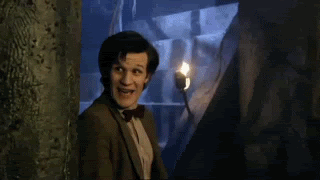
Everett is less so, but despite knowing what Hobey is doing, he can’t actually find him.
At Century, Lyo and the Avenger discusses the antennas. Lyo mentions another superhero, who faced a similar enemy. In 1949 Astrongman faced down the Perciever, who could anticipate his opponent’s every move… then reality interfered and it turned out that you also need to be fast enough to react to those moves, and Astrongman knocked him of a building before he could.
Ouch.
The Perciever survived though, because a few years later, Astrongman faced him again. Which is where this becomes relevant, as Astrongman used an anti-psych cap to keep his thoughts safe. The Avenger is free to borrow it.

Your name is the DUCK Avenger and you’re a duck. I’m not sure you get to criticise.
Hours later, Hobey is busy mindreading in a bank. He’s also being terribly rude to the staff, but whatever, he does get blackmail material on the governor. He wonders how much cash the various news would pay for that.
Speaking of news! Angus is about to run a story on Ducklair Enterprises, despite having zero information. Except the is one thing they do have a tiny bit of information on, and that’s the antennas. Angus begins a little tirade about why the exist, and the comic goes from Angus’s news to the Avenger making a plan to blow up every antenna in a chain reaction.
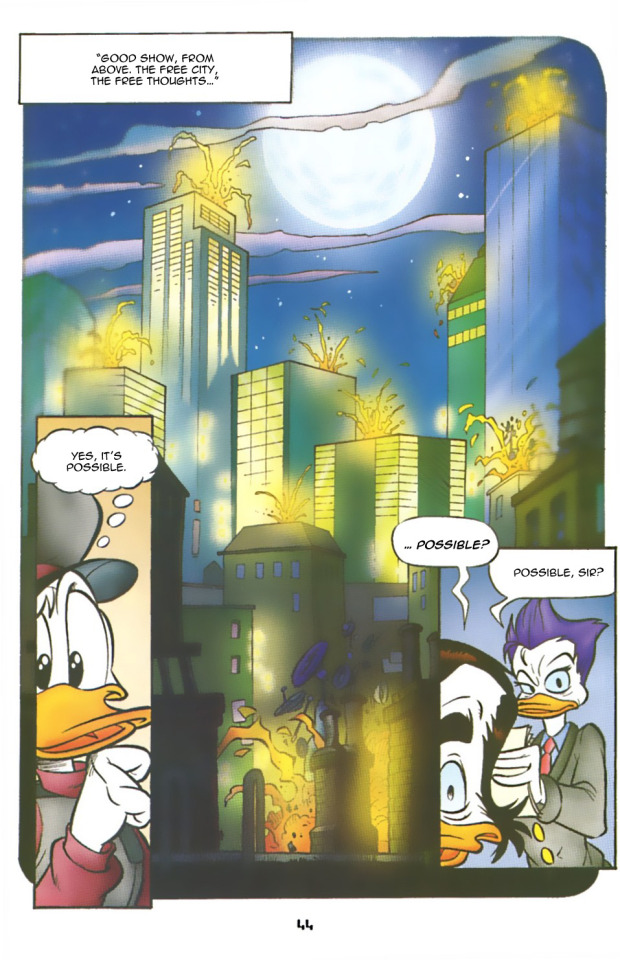
... so about that secret identity you erased from your memories... how’s that holding up?
After this strange outburst, Everett calls on Lyla to inform her about Angus’s story and implies she better deal with it. Before going right back to whatever psychic connection is tying him and the Avenger together.
The Avenger is currently Donald and at work, where Stella, once again concerned about her friends offers him a massage.
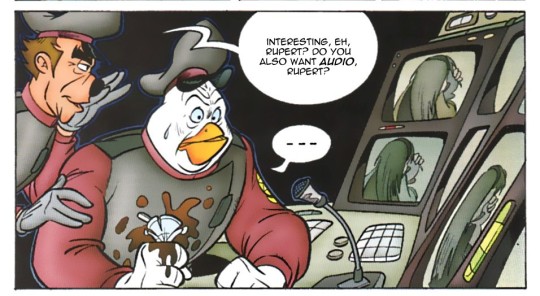
Why does anyone listen to this guy, anyway?
At the governor’s residence, Hobey is ready for some blackmail. The governor is naturally not interested at first, but when Hobey lays out the evidence along with the standard “I have copies and they will be sent to everyone if I don’t get back home safely” speech, he folds like a house of cards.
It turns out that the governor’s crime is that he requested kickbacks from the company that installed the Ducklair antennas. The governor tries to deny that he has any relationship with Everett, apparently the governor doesn’t like him, but Hobey isn’t buying it. Or rather, he is, but that’s because the only reason the governor would go down the supply chain to ask for kickbacks is if Everett told him “no”.
Unlike the governor though, Hobey does like what Everett does. He understands it.

I’m gonna take a stab in the dark and say no, no, you don’t. Wow, Korinna did a number on you.
Meanwhile, Angus has managed to trigger entire demonstrations against the antennas. Damn. Duckburgians are easily riled.
Anymore Boring is very concerned about this, but Everett takes it very calmly, saying it’s time to teach everyone a lesson.
And in the third line, the Avenger has fixed Astrongman’s hat and is blowing up antennas like a champ. Three down, hundreds to go. Too many, so the Avenger tries to tell the angry crowd to stay away from the antennas as they are pretty dangerous.
Luckily for everyone, Everett turned off the self-defence systems hour ago.
Hobey tries to defend the antennas, but the angry crowd has reached critical mass and can not be stopped.
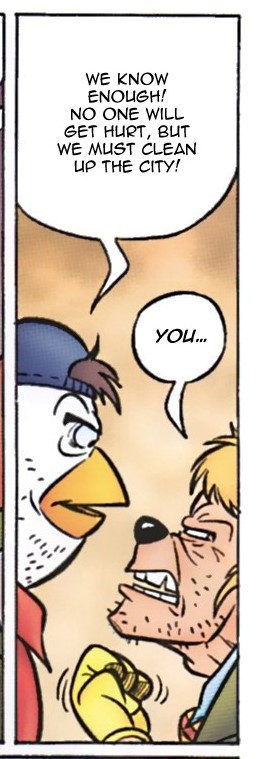
Do Not Tangle With A Mob.
Angus worries about the very likely lawsuit coming from him having riles up the city, while Hobey makes a run for the main antenna. He thinks he can keep the crowd away from it, but Everett is skeptical.
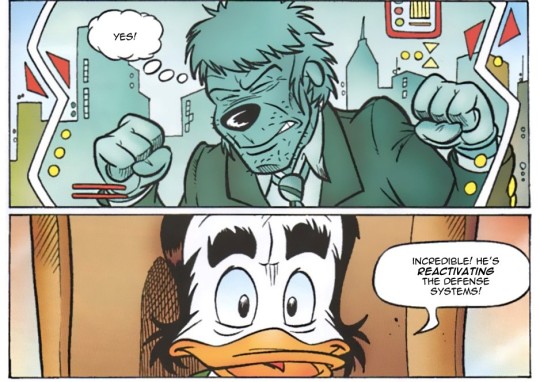
And, shockingly, he underestimated his opponent. Well, I never.

Robot-Bugs of DOOM.
The fight rages on until…
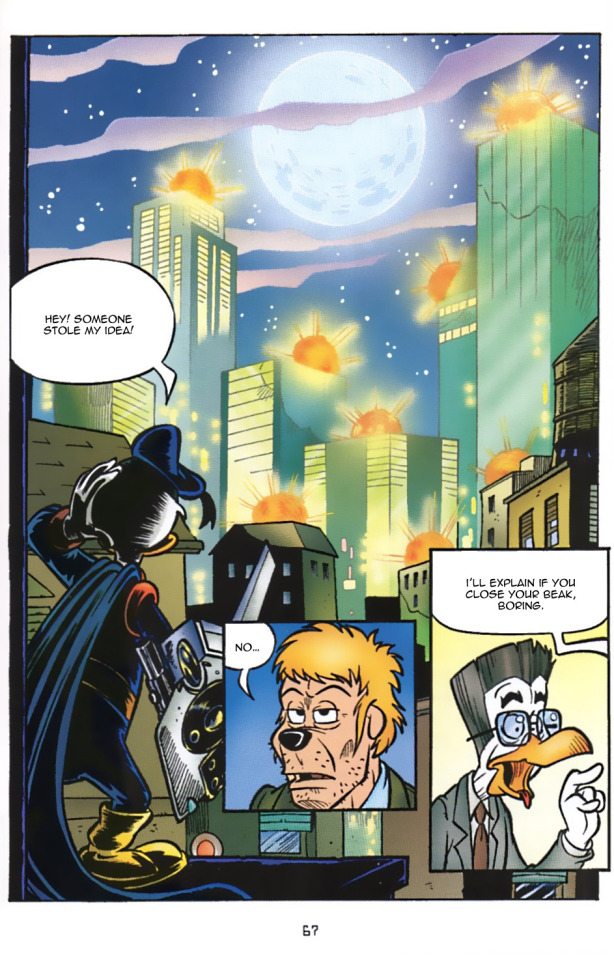
This has been one hell of a spectacle.
And with that, the antennas are gone, and everything goes back to normal. All according to plan!
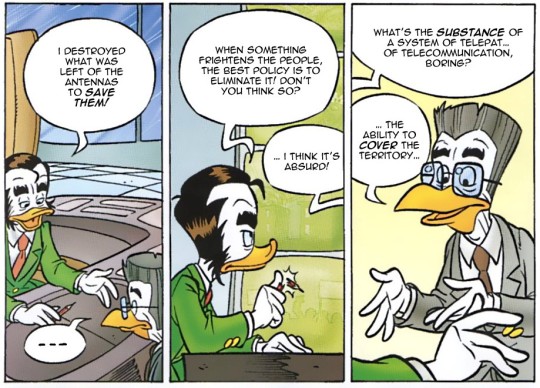
Look at you, Boring, reacting like a normal person! You’re in for a wild ride.
No, really. Everett foresaw that something might happen to the antennas, and built them so that the cables, AKA the important stuff was still safe even with the antennas blowing up. And now that people have rioted and destroyed some stuff they’ll forget about it and not think about the cables.
As for the actual events, that was improvisation.
And so it’s all over as Hobey gets arrested, and that kinda pisses me off. Give the man a break and get him so actual help!
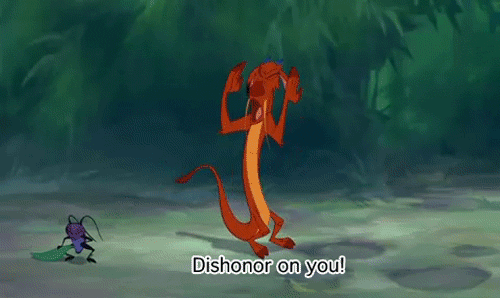
So the Avenger goes back to his dayjob for now, and Everett won the battle.
A rather important battle, since he’s got the mind-reading system up and running and no one knows, dun dun duuun.
What I’ve always liked about this issue, other than the focus on the poor guy who got caught up in this mess through no fault of his own, is that even knowing the above, I am always left feeling like that was a lot of spectacle over very little. Why not go for cables immediately?
But thinking about it... The very visible, very obvious antennas distracted the Avenger, distracted Angus, distracted basically everyone from whatever else Ducklair Enterprises might be doing, including the main purpose of the antennas. And now they’re gone, seemingly because Angus whipped up a freaking mob.
So the people involved in that would probably not dig too deep, because they’re at the risk of getting arrested or sued, Ducklair Enterprises removed the problem so they look good (though the method was, uh, questionable), and the very visible antennas are gone, so who cares?
So now Everett has a very useful telepathic network up and running, and no one knows. Victory!
13 notes
·
View notes
Text
Risk-Averse? You Can Still Make It As An Entrepreneur.
June 17, 2020 7 min read
Opinions expressed by Entrepreneur contributors are their own.
Pandora founder Tim Westergren maxed out 11 credit cards to keep his music-streaming service alive.
Jeff Bezos quit a lucrative hedge fund gig to start Amazon out of his garage. He and the company neared financial ruin before the online bookstore finally took off.
The greater the risk, the greater the reward, right?
That’s what a lot of those startup glory stories would have you believe — that making it as an entrepreneur requires wagering everything. But what about those of us who prefer a slower, steadier path? Is it still possible to reap huge rewards without risking it all?
I’d argue that it is. If you have a business idea but you’re not quite ready to jump into the deep end, there’s an alternative path to startup success. Here, a few tips for launching your business without the usual risks.
1. Keep your day job
Keeping your day job while you work on your passion project is a great way to launch a business and reduce early-stage risk — plus, you can pick up skills and experience along the way. Before launching my own company, I was a junior developer for a software firm. Early mornings, nights and weekends, I worked on my budding online form company. But during office hours, I learned valuable lessons about operating a business.
There’s no shame in financing your side hustle with your full-time job, either. As Katy Waldman writes for the New York Times, it’s not uncommon for great artists to utilize their skills and talent in a job unrelated to their art.
“The novelist goes into screenwriting, like Dave Eggers or Ray Bradbury. The poet becomes an ad man, like James Dickey, who crafted slogans for Coca-Cola.”
In fact, your day job may give you a sense of structure and security while you prepare to launch your own venture. As Waldman writes, it “might perform the same replenishing ministries as sleep or a long run: relieving creative angst, restoring the artist to her body and to the texture of immediate experience.”
Related: How to Take the Right Risks
2. Start small and be patient
VC-funding might seem like the fast track to success, but bootstrapping can also be highly beneficial. Not only does it reduce your risk, but it can also boost your creativity and drive.
Ryan Smith, co-founder of Qualtrics, writes for Harvard Business Review:
“When you bootstrap, you are forced to get good fast. As humans, we prefer to put in only as much effort as we need to, but whether we recognize it or not, we all have extra gears. Sometimes it’s not until things get really tough that we find the gears that allow us to shift into overdrive — that is what bootstrapping does for you.”
When companies accept VC funding, Smith argues that they’re oftentimes forced to focus on the short-term — pleasing funders and realizing an early exit — rather than long-term goals like continued innovation and longevity.
Use the resources you have. No matter how modest, you can start small and grow slow.
3. Focus on solving one problem
In “Zoom: Surprising Ways to Supercharge Your Career,” author Daniel Roberts explains why entrepreneurial success depends on doing one thing exceptionally well.
Take Twitter: at the outset, their goal was simple: to enable users to share real-time status updates in 140 characters or less. As reported by Business Insider, Roberts argues that “Twitter has succeeded in large part because it never lost sight of that simple starting principle, even as it began to monetize its services and add new features.”
To be successful, you don’t have to reinvent the wheel or utilize cutting edge AI. All you have to do is solve one real-world problem. Like Kara Goldin, a former Diet Coke addict and the founder of hint Inc. flavored water, says:
“Starting ‘hint’ was really about solving a problem that no one else was working on.” For Goldin, the solution was a healthful alternative to her beloved beverage.
So ask yourself: what’s one issue you face that’s just waiting for a solution?
Related: 5 Ways Entrepreneurs Learn to Manage Risk
4. Don’t complicate the ($) math
Specialized accounting systems can provide valuable insight into your company’s financial health, but at the end of the day, here’s the one question that matters:
Is your company profitable?
To be profitable, you have to earn more than you spend.
As Neil C. Churchill and John Mullins write for Harvard Business Review:
“A key challenge for managers of any growing concern, then, is to strike the proper balance between consuming cash and generating it. Fail to strike that balance, and even a thriving company can soon find itself out of business—a victim of its own success.”
Sustainable growth depends on your revenue. Don’t hire a new employee unless you have a year’s worth of their salary in the bank. Don’t increase your expenses unless your sales match the increase. Keep an eye on your cash flow and stay within your balance.
5. Don’t lose sight of your core mission
In 2006, in an effort to boost business, McDonald’s doubled its menu offerings. Sales barely changed. Then, in 2016, the fast-food goliath
pivoted. Writing for Harvard Business Review, Tiffani Bova explains:
“It went back to basics, dropped most of those additional items, and instead extended its popular breakfast offerings. Sales finally jumped, with same-store revenue up 6 percent in 2017, and the stock rose by 40 percent.”
With a more extensive menu, customers were slower to order and service lagged. McDonald’s fast-food wasn’t so fast anymore. When they, instead, offered customers the same products they loved throughout the day, business boomed.
McDonald’s is a far cry from a startup, but the lesson is valuable: Remember your core mission, whether it’s fast-food or fast, reliable service. That’s why your customers chose you in the first place.
6. Let people know
According to developer and entrepreneur Jason Roberts, the amount of serendipity you experience “is directly proportional to the degree to which you do something you’re passionate about combined with the total number of people to whom this is effectively communicated.”
It’s an idea he calls your “Luck Surface Area,” and highlights an important aspect of being an entrepreneur: getting the word out about your product or service.
Today there are so many ways beyond traditional marketing agency to let people know about your projects: publishing blog posts and articles, sharing on social media and in-person networking. What’s more, sharing your work can also help you to refine and improve it — another way to reduce your overall risk.
Communicate your hard work with the world and be proactive about increasing your Luck Surface Area.
Launching or running a business is inherently stressful, but hopefully, with these tips, it can be a little less so. You can start solving one of the world’s problems without gambling your wellbeing.
Related: 7 Keys to Overcoming Risk on the Path to Success
loading…
Website Design & SEO Delray Beach by DBL07.co
Delray Beach SEO
source http://www.scpie.org/risk-averse-you-can-still-make-it-as-an-entrepreneur/
source https://scpie1.blogspot.com/2020/06/risk-averse-you-can-still-make-it-as.html
0 notes
Text
10 Skills to Empower Yourself With During This Lockdown
These are troubling times, and this serious global health threat has disrupted millions of lives. However, that doesn’t mean you can’t divert your energy towards more productive outlets. Here is the time for you to finally do those things you’ve always wanted to but never got around to.
Surely a couple of things come to mind, skills you said you’d learn but never did, hobbies you wanted to try your hand at.
The lockdown doesn’t have to be entirely boring and you can actually emerge out of this as a highly-skilled individual. Even top companies are suggesting that their employees take up a new hobby or learn a new skill. This not only helps build your skillset but also keeps your mind busy and productive. You may wonder, “How do I learn a new skill at home?”. With so much available on the internet, the answer is simple: online classes! You can find several free beginner classes, and there are always Youtube tutorials available as well.
A little note here: if the skill of your choice involved outdoor activity, then it’s best that you don’t take it up at the moment.
However, there are myriads of other skills you can still learn or get better at during the lockdown. Here’s a whole list of them to help you find the one you like.
1. Learn a Language
Do you remember all the times you said you’d learn a language, if only you had the time? Well now’s your chance! Learning a new language is not only fun but is also beneficial in many ways. For example, multilingual people are more adept at multitasking. Since such people are used to switching between two systems of speech, this improves their ability to switch seamlessly between tasks as well.
Another advantage is that your memory improves. Think of the brain as a muscle – if you don’t exercise it, it will weaken. Learning a new language is the perfect exercise to strengthen your mental “muscle”. More advantages include becoming more perceptive, making greater rational decisions, and actually helping you improve your first language.
The next part is figuring out which language to learn. There are obvious options: French, Italian, Spanish, and the like. However, there are some others you may want to consider as well, such as Mandarin Chinese. Currently, China’s GDP is set to overtake America’s by 2030. So if you’re a businessman, learning Mandarin is one of the smartest moves you can make.
2. Take a Programming Course
Programming is a great skill to have on your CV always. Even if it doesn’t have anything in common with your current job, learning how to code can also serve as a creative hobby. Once you get the hang of it, you can learn to write programs for yourself, create entire websites, build your own tools, and more.
Coding is so instrumental to today’s world that schools are now adding programming classes to their curriculums.
Based on what your end goal is, you can decide between different types of programming languages. Generally, an excellent language to start off with is Python. Python is a high-level language, meaning you can do a lot with it. It’s also an increasingly popular one among data scientists, engineers, and developers.
The internet is swamped with online programming courses. You can find some on Coursera, Udemy, Class Central, etc.
3. Try Your Hand at Cooking
Many people have taken up cooking during this lockdown, and there are several reasons for that. For starters, since you can’t go out to have your favorite meal, you might as well try making it at home. Secondly, right now is the perfect opportunity to learn a valuable life skill that every person should have.
And lastly, cooking and baking are very therapeutic for most. It encourages creativity and is known to have a calming and meditative effect. That is why you may have noticed everyone you follow on social media is suddenly a culinary maestro.
For everyone who’s working from home, cooking also helps cater to all the midday cravings you get where you’d normally head to the vending machine. You can now make healthier choices and create your own quick and easy snacks for a midday office boost.
You can find simple recipes online for whatever you want. Chefs are also creating easy recipes for beginners who are trying their hand at cooking during the lockdown. There are also videos on Youtube where you can follow along with the chef in real-time.
4. Do Some Gardening
If you’re really interested in keeping an eye on what goes into your cooking, then you can take this a step further by planting your own vegetables too. Even if you don’t intend on using your plants in your cooking, there are still plenty of reasons why you should take up gardening.
Gardening has been known to have a positive impact on your mood and brain chemistry. Certain rhythmic and repetitive movements have a calming effect on the nervous system. This is why movements in gardening, whether it’s mowing the lawn or pulling up weeds, leave you peaceful and calm.
You can find several resources online, and free of cost, on how to sow seeds during the lockdown and how to tend to your garden. You can easily order seeds and pots of your choice online, so what are you waiting for?
5. Play an Instrument
Of course, this one isn’t for everyone, because not all of us have a musical instrument lying around conveniently. If, however, you do have a guitar or ukulele with you, now is a good time to dust it off and get playing.
While there are many online classes available, there’s one designed particularly for the lockdown that you may want to check out. The guitar manufacturing company Fender is offering three months of free online lessons to see you through the lockdown.
The lessons include learning the guitar, bass, and ukulele. Musicians teach the lessons and you can download the videos to go over, again and again, and practice as you wish.
Music has always been known to help reduce stress and put you in an uplifting mood, leaving you happier than before. Since we’re all stuck at home, you might as well make some noise!
6. Get Creative With Photoshop
Graphic design is always an in-demand skill to have. You can easily turn this hobby into a valuable skill as well by freelancing on the side to earn some extra income. Once you learn how to use Photoshop, your creativity will know no bounds.
There are courses you can take to learn everything, from the basics to a more advanced level. However, if you don’t want to enroll in a course, you can easily find online tutorials on Youtube. If you want to create a logo or a business card, or simply edit pictures with different effects, there are tutorials for everything.
Adobe itself also offers tutorials, so you can learn right from the creators themselves. Another benefit of taking up Photoshop is that it doesn’t limit you to your laptop. You can also download the app on your phone or tablet and continue from there, on the go.
Once you’re adept at it, you can start creating your own art and eventually even sell it.
7. Work on Your Soft Skills
Since you’re in isolation, now is a great time to work on yourself and your soft skills. There are courses such as “Creative thinking: Tools for success” and “Improving communication skills” that all of us can benefit from.
Employees who undertake such courses are certainly going to benefit at their jobs as well. Businesses always recognize and value individuals who proactively seek to diversify their skill sets during downtime.
With such skills, you can improve your confidence, learn how to command a room, and dazzle the audience. Your CV isn’t the only thing employers focus on in an interview. They’re also looking at you as a person; how you talk and formulate your thoughts. If you improve such soft skills right now, your chances of employment are bound to improve.
8. Try Creative Writing
Have you always wanted to start your own blog? Now’s your chance to! You can find great resources online about how to do just that. And with all the ample time on your hands, you can put your creative juices to good use. Writing helps you express yourself and it’s a great way to unburden yourself by leaving it all on the paper.
Some of the best writers in the world only produced their best works when they were left in isolation. As you find yourself in a similar situation, there’s nothing stopping you from writing now and joining their ranks!
Even if you don’t intend on starting a blog or writing a book, you can still benefit from writing. It will eliminate stress and help you communicate with greater clarity.
Many successful writers offer online courses to help you find your writing style. You can learn all sorts of techniques about how to develop a plot and create suspense. There are also countless interesting writing prompts available online.
9. Start Doing Yoga
In such times of turmoil, all of us need a combination of physical and mental exercises – yoga is just the answer. Yoga is for everyone, irrespective of what age group you’re in. It helps keep your body flexible and active while calming your brain as well, detoxing all the negativity of the day.
Don’t let all the yoga terminology and fancy named poses intimidate you. You will easily get a hang of everything once you start watching some tutorial videos on Youtube.
The important thing is to focus on your posture and breathing techniques. If your posture isn’t correct, then the yoga exercises may do you more harm than good. For this reason, it is important that you stick to watching videos instead of reading blogs.
The benefits of regular yoga are wide-ranging. It helps keep your back and joints healthy, improves your posture and balance, and strengthens your muscles. Relaxation is built into every yoga session, so you will find yourself much more peaceful by the end of it.
10. Video Editing
I’m sure everyone has always wanted to capture a beautiful video to remember important memories, complete with the perfect soundtrack and seamless transitions. However, video editing just wasn’t as easy as it sounded so you never got around to pursuing it.
Now is your chance to learn how to create beautiful, quirky, funny videos. Learning how to shoot and edit videos requires time and patience. Luckily, you have ample time on your hands in this lockdown! You can watch online videos on how to edit videos, which software to use, and tips on what to do and not do.
Video creation is relatively easier than video editing. Video editing requires you to have an eye for detail. This means you have to notice and fix the smallest of things such as the alignment of elements, etc.
Once you get the hang of it, you can also start taking on freelance projects. Companies are always looking for freelancers who can edit video content for various platforms. If you want, you can even narrow yourself down to either an online video editor or specifically as a social media video editor.
Time to Pick a Skill!
While a certain situation of uncertainty prevails, we can still focus on the few positives of the situation. We now have time than ever before to focus on developing ourselves and our skills. If we don’t make efficient use of this time, we’re going to regret it later on.
Picking up a new skill is bound to help you set a routine during this new reality everyone is trying to venture through. With something to divert your attention, you won’t constantly be anxious and stressed out about the pandemic. It’s best to reinvest the time into something productive instead of binge-watching shows. Any kind of knowledge is only helpful and will serve you well.
Remember, stay safe and stay at home!
The post 10 Skills to Empower Yourself With During This Lockdown appeared first on CareerMetis.com.
10 Skills to Empower Yourself With During This Lockdown published first on https://skillsireweb.tumblr.com/
0 notes
Text
Teaching vs Schooling
In light of how pandemic measures are changing the norm for a lot of people, I’ve been seeing an uptick in memes and trite sayings, quotes and speeches about teaching and schooling.
A lot of those memes and sayings are really… lacking. To say the least.
My least favourites are the ones saying it’s impossible for parents to effectively teach their kids, or that imply only Teachers™ can effectively teach kids.
As many home learning families will tell you, that’s categorically false. Kids learn from many kinds of teachers and Teachers™ in the course of their lives. There’s a lot of privilege in assuming that everyone has access to Teachers™. There’s also a lot of privilege in being able to create learning environments that are not in the middle of a building designed to house groups of students, frequently grouped by birth year and geographic proximity, by choice.
What really every one of those memes is trying to get at is that Schooling, as most know it, is impossible to do at home by parents who may be trying to work through a crisis (either in the practical sense of processing a crisis, or in the literal sense of holding a job through a crisis, or both) such as this pandemic has created.
Schooling as is commonly practiced today, is rooted in training up masses of the population to be the equivalent of button pushers who never question authority. Sure, the curriculum has changed over the years, but the very system of schooling employed by public education entities in the western world is directly based off a cookie-cutter approach.
Pedagogy may shift with modern trends, but at the end of the day, the report cards are typically about how well any given child “fits in” a system that is not actually designed for them.
It’s one of the many reasons that a lot of families choose to find alternatives to public education systems, including homeschooling or other forms of home learning.
Now, that’s not to say there is no value in public education, or rather, education of the public/everyone. Education is, or should be, a right, not a privilege.
What is a privilege is the delivery of that education. There’s a reason the wealthy neighbourhoods and communities have shiny school facilities, private schools, wider selection of “extra curricular” activities and often better programming and curriculum execution.
Now that most of society is practicing physical distancing, schools have closed in much of the world, and kids are largely staying home with primary caregivers, we see panic and overwhelm.
And yes, it’s absolutely overwhelming to try and take the programming and activities that work in a brick and mortar school, in a classroom of similar-aged kids and take those back to individual homes and expect kids to walk away with the same lessons learned. In fact, I find it absurd.
Many many Teachers™ actually aren’t expecting it to work that way, no matter what school boards, education and government entities are suggesting. Thankfully, they recognize this is Crisis Schooling or Crisis Teaching and have made recommendations accordingly.
It’s very tempting to cop out and say, “I’m not a Teacher™, I can’t teach my kid(s)”, in light of all the messages coming out about education and teaching, and Teachers™.
And while you may not have a degree, or even a natural aptitude for teaching, your kids have already learned a lot from you.
Whether they learn their ABCs, algebra, physics or whatever from you, there are very valuable lessons you can teach your kids, right now in the midst of a pandemic crisis, whether you are actively attempting to teach them or not.
Your kids are watching you, how you handle a crisis, how you manage household tasks, how you handle overwhelm and anxiety, how you cope with changes that come fast and frequently and often unexpectedly.
They’re learning how to manage emotions, how to accept responsibility, how to weigh out the importance of tasks and obligations, how to show empathy and compassion.
And yeah, you’re not going to get those 100% correct, 100% of the time, so you will have opportunities to model humility, apology, and correction, too.
If this generation of school-aged kids learns nothing but how to be compassionate, empathetic human beings, who can own their mistakes and do better the next time, for the duration of the pandemic, it would still be a resounding success.
0 notes
Text
Lessons From Solitary Confinement: Nurturing Self and Child Development at Home During Coronavirus
Anxious. Overwhelmed. Fearful. Powerless. These are just a few of the emotions I’ve experienced during this period of social distancing caused by the aptly named coronavirus crisis. I’m incredibly fortunate and grateful to be surrounded by my immediate family during this time; however, as an extrovert and self-proclaimed ‘people person,’ I’ve been both haunted and intrigued by the question of how to successfully cope with and manage my time, and more importantly, my mind, when faced with chronic social isolation.
While social isolation is a new phenomenon for many of us, it’s a soul-crushing, enduring reality for 80,000 to 100,000 people who spend months and even years in solitary confinement as inmates in our U.S. prison system. In a recent Mother Jones article, Keith LaMar, an inmate who’s spent his last twenty-seven years confined to a space the size of a small bathroom, shared insights on how to maintain a sound mind amid extended physical confinement.
What’s Keith’s secret you ask?
Education...
When Keith speaks of education however, he isn’t talking about education in the traditional sense of the word; instead, he’s talking about a form of self discovery that’s demonstrated in education’s root word, ‘educe’, which means “to bring forth that which is already there.” Keith shares that solitary confinement, and consequently, social isolation, is an opportunity for introspection, growth, and personal development.
While you and your family should feel content with just being during this time, or better yet, just being healthy, it’s a great opportunity to use this societal pause to more intentionally push play on your own as well as your family’s development.
Below are a few easy ways to better get to know, nourish, and grow yourself and those closest to you in the coming weeks:
Carve Out Time to Focus On You
The road to self discovery starts and ends with you, so spend some of your socially distanced time getting to know YOU. How often do you take the time to really think about what you enjoy, to explore your interests, passions, and needs, or to work toward your dreams?
Close your eyes and think about three things that, despite coronavirus, you’re insanely grateful for, or better yet, think of three things that you currently possess that you would be incredibly empty and lost if you woke up tomorrow without. Examples include family relationships, peace of mind, physical health, etc.
Now consider one change you can make over the course of a week to more intentionally operate or improve upon each of those three areas. This could be as simple as daily commitments to carve out at least an hour of quality time with your significant other, dedicate 30 minutes to some form of physical activity, or make time daily for meditation or prayer. It doesn’t have to be grandiose, lucrative, or insanely productive; it just needs to be valuable to you and intentional to serving the values that matter most.
Start by focusing on one of these areas each week, adding more as you feel comfortable.
This exercise has allowed me to define and spend my energy on values and goals that are uniquely personal and meaningful, values and goals that I’ve previously allowed others to define for me.
Foster Your Personal Growth and Development
If you’re feeling up to it, use some of this time to develop skills and explore interests you didn’t have the time to previously explore.
Use e-learning resources and youtube to learn something new.
Always dreamed of learning to code? Do it. Want to learn a new language? Go for it.
Or maybe you’re just trying to add a few new recipes to your dinner arsenal? Now is a great time to lean on Pinterest and Blue Apron and nurture your inner Top Chef.
Embrace the immense possibility that accompanies times of uncertainty like this, and use today to hone and develop skills that can set you and your family up for success tomorrow. No matter how bleak things might seem today, it’s a chance to get better and be better, so seize the day.
Get to Know Your Children… as People
As parents, we’re constantly challenged with molding, shaping, and shepherding our children into adulthood. It’s an amazing feat, and a challenge we typically don’t have the time or space to truly think about and focus on. From getting everyone ready each morning, and school drop-offs and pick-ups, to extracurriculars, dinner, and bedtime, we typically fast forward through life, doing lots of things for our children but not necessarily spending quality time with our children.
Spend this time of seclusion and social isolation to change that by getting more in touch with your children’s personalities, interests, pet peeves, and idiosyncrasies.
Who are they? Depending on their age, they could be vastly different than they were a few months ago.
Any new traits you haven’t previously noticed?
Any new interests or dislikes?
What’s something they’re really good at?
What’s their favorite thing that you do together?
What new things can you do together?
Unplug. Set aside some time without your devices to talk, play cards, or play a board game.
If you have multiple children, spend time together, but also carve out quality time to engage one-on-one with each of them. Every child shares themselves and bares their souls differently, but being able to use this unprecedented time to learn more about them will make this time more precious for both of you.
Since all we have is time at the moment, make those seconds and minutes count!
Embrace the Digital Age of Education
With schools closed, moms and dads across the globe are now the sole stewards of their children’s learning and development. The good news is, we have more knowledge at our fingertips than any other time in history; so embrace online learning tools, websites, and virtual resources. Moreover, since traditional K-12 classrooms tend to disproportionately emphasize content memorization as a result of our increased focus on test taking,
Use this as an opportunity to create a more open, personalized environment for your child that’s conducive to deep learning, practical skill-building, and critical thought.
Make it fun, make it practical, and focus on mastery of skills over content.
Use digital resources -- audio books, YouTube videos, and even Netflix movies -- to empower your child to learn more independently and autonomously, with you merely assisting and facilitating their quest for knowledge.
One of the greatest joys, but also greatest challenges in life is self discovery. Truly discovering who you are -- good, bad, beautiful, and ugly -- can be painful, but also extremely enlightening. As parents, we’re also trying to discover who our kids are and help mold them into their highest potential. Use this time, as Keith LaMar recommended, to bask and explore the self discovery uniquely suited for this type of isolation, and empower your children to do the same.
While there are feelings of confusion and loss that accompany no longer having the routines, social interactions, and community we took for granted prior to coronavirus, I truly believe that although there are many things we’ve individually lost, greater things can be found -- deeper familial bonds and connections, more intimate awareness of self, more individualized and personalized development and growth. And wouldn’t that be the most beautiful silver lining to it all?
If you enjoyed this post and would like more information on being intentional with your life, check out my posts on value and goal-based living, intentional self-care, childcare and development, and relationships.
0 notes
Text
Adam Radly Bob Bates: $250m valuation by pivot from online games to meditation company
Adam Radly Bob Bates
https://www.entrepreneur.com/article/321960
One summer morning in 2014, Michael Acton Smith sat on a balcony overlooking a lush green valley in the Austrian alps.
He had booked a vacation by himself to get away from the stress of his crumbling online gaming company. The view, composed of abundant grass and far-off mountains, seemed almost cookie-cutter -- evoking a postcard, a computer desktop, a backdrop to rousing words on a motivational poster.
But Acton Smith wasn’t taking in the scenery. His eyes were closed, and his mind was clear.
That stretch -- 10 minutes of peace, he recalls -- was the co-founder of Calm’s most clarifying meditation experience. A friend (and Calm’s co-founder), Alex Tew, had entreated him to try the practice, but Acton Smith had rolled his eyes for years. It's too woo-woo, he thought. Religious. And what's up with the incense and outfits? Finally, after a mountain of stress at his company and continued encouragement from Tew, Acton Smith gave meditation a real shot.
Two years later, Acton Smith would join Tew in devoting himself to Calm full-time. It paid off. In 2015, he said, the meditation app brought in $2 million. By 2017, revenue had multiplied tenfold -- and the company won out over millions of others for Apple’s App of the Year.
Seated on that balcony in 2014, conscious of his breath, Acton Smith opened his eyes for the first time. He calls it his lightbulb moment.
Everything around him seemed brighter.
The Detour
Acton Smith’s childhood was filled with pet rocks, Tamagotchis and video games, so it was only natural that around age 30, he started a kids’ entertainment company.
Mind Candy focused on online gaming, and soon after its launch in 2003, Acton Smith raised $10 million in venture funding. The idea that landed him the cash? Perplex City, a long-term alternative reality game in the form of a global treasure hunt. Users around the world would search for a stolen artifact from a fictional metropolis (Perplex City) using clues, puzzles and ciphers, the winner receiving a real-life reward of 100,000 pounds.
The search began in April 2005. Clues were decoded, trading cards were purchased and communities were formed, with the game wrapping up after one man found the artifact and won the reward in February 2007. But the game, at least financially speaking, was better in theory, and Mind Candy put the second round on hold indefinitely. It was a “commercial disaster,” Acton Smith says. With less than $1 million left in the company’s account, he knew he had to do something quick to turn things around.
He spent months brainstorming in London coffee shops with nothing to show for it except fruitless scribbles. But one day, Acton Smith’s napkin doodles yielded a series of little monsters, and he knew he had something. Those doodles would evolve into Moshi Monsters, an internet “pet” that, beginning in October 2007, would take the U.K. by storm.
The world of Moshi Monsters was similar to that of Neopets or Tamagotchi -- kids could log on and feed, hug or walk their monsters, and the pets’ personalities developed according to how well they were treated. There were online games, puzzles, shops -- even a messaging system for kids to chat with their friends. And those kids were the product’s best ambassadors, spreading the game like wildfire among classmates, extended family and friends at different schools.
“It took a few years before it caught fire, but when it did … it grew like nothing I’d ever seen before,” Acton Smith says. By the game’s 2012 peak, half of all British childrenages six to 12 had reportedly adopted a Moshi Monster.
That level of growth resulted in a broad swath of partnerships. With Sony, a music album. With Universal Studios, a movie that premiered around the country. With SkyJack Publishing, a magazine that -- within six months of its launch -- became the best-selling children’s title in the U.K. Tens of millions of physical toys were being sold, awards were being won, team members were being hired (at one point, Mind Candy had more than 200 employees).
“We thought we were going to be the next Disney,” Acton Smith says.
But by fall 2012, Moshi Monsters had begun to fall apart. To Acton Smith’s shock, the virality that had propelled Moshi Monsters into being the “coolest thing on the
playground” was also the principal factor in its demise.
For the past couple of years, Moshi Monsters’ subscription model had been raking in revenue -- parents paid for their kids to use the site, and there wasn’t much competition at the time. But in 2012, parents began buying their kids smartphones and tablets instead. The brand faltered when it attempted the switch from internet platform to mobile app. The revenue model would have had to change from subscriptions to in-app purchases, the company’s marketing technique would have required an overhaul and, with thousands of other apps at a child’s fingertips, there was simply too much competition.
One minute, Acton Smith felt like the poster boy of the U.K. tech scene with hundreds of millions of dollars at his disposal. A few weeks later, he couldn’t sleep through the night for fear of being unable to keep his company afloat. That constant stress would last for years.
“I thought the world was ending,” Acton Smith says. He felt his self-worth and success were interwoven with the business, so when it began to fail, he felt completely responsible. That led to bouts of insomnia, exhaustion, headaches -- and things worsened when, over the next three years, he had to lay off 200 employees.
Acton Smith learned a valuable lesson about the often-fickle world of entertainment -- particularly kids’ entertainment. “Just because you’re growing like crazy doesn’t mean you’re going to grow like crazy forever,” he says.
The Leap
In 2006, Acton Smith met Alex Tew for the first time on a boat. The year before, he’d seen a deluge of headlines surrounding Tew, a teenager who, to raise money for college, created a website and sold each of its million pixels for a dollar each -- reaching millionaire status in just four months. The two became fast friends, then housemates. Tew was the first person to teach Acton Smith about meditation, and they often sat on their sofa discussing philosophy, neuroscience and business ideas.
In 2012, the two purchased Calm.com with the hazy idea to create products to help people relax, but although they floated ideas such as soothing videos and relaxing sound effects, they weren’t sure of its concrete direction. The next year, Tew moved to San Francisco for another job, and the two had regular transatlantic phone calls about the future of the company. The next year, for Acton Smith’s birthday, he, Tew and a group of friends took a trip to the Italian countryside. They had in-depth conversations about mindfulness and where they might take Calm, and they meditated together in the Tuscan hills.
That same year, when Moshi Monsters’ revenue began to tank, Acton Smith did something he’d never done before: Take a step back, alone in a new place, and collect his thoughts. He decided on a solo trip to the Austrian Alps and brought along books on meditation. One of them, 10% Happier, struck a chord. Nightline anchor (and, as he puts it, “lifelong nonbeliever” in self-help) Dan Harris had penned it after experiencing a panic attack on Good Morning America, then finding a down-to-earth meditation regimen that worked for him.
Something clicked for Acton Smith when he discovered that meditation wasn’t as much about incense or religion as it was about neuroscience. “I realized it was an ancient but valuable skill that could be relevant for everybody,” he said. He tried it on his hotel balcony on vacation, and afterward, he felt less stressed and more conscious of his breath. Colors even appeared more vivid.
Though Tew had been pushing Calm’s focus on meditation for a while, it wasn’t until Acton Smith’s balcony meditation experience that he agreed. Later that day, Acton Smith pulled out his notebook and poured out ideas for the company. He had experienced firsthand how stressful life -- and business -- was in Western society, and he felt that for most people, the future skewed even more stressful. He remembers thinking: Instead of being in the entertainment industry -- here today, gone tomorrow -- what if we could build a brand that could outlast us and be here for centuries? Wouldn’t that be an amazing thing to dedicate the rest of our careers to?
Over the next year or two, Tew and Acton Smith chatted via phone, found developers and started to build Calm as it is now -- guided meditation and programs for everyone, both beginner and advanced. By January 2016, Acton Smith finally felt ready to step away from Mind Candy. He found a new CEO to take over (though he maintains, to date, his role as chairman) and moved to San Francisco to dedicate himself completely to Calm. He and Tew, who had already been working full time on Calm, agreed to be co-CEOs and split the company equally, but at the time, revenue was touch-and-go -- and the company didn’t have much money banked.
The Breaking Point
During the first half of 2016, Acton Smith worried whether Calm would be able to “keep the lights on.” At the company’s lowest point, there were a few thousand dollars left in the bank.
It didn’t help that potential investors kept giving them the boot.
Acton Smith and Tew left dozens of pitch meetings with “no” ringing in their ears. “When that happens a few times, you can cope,” Acton Smith says. “When it happens dozens of times, it makes you question whether you’re on the right path and whether smart investors know more than you do.”
Acton Smith heard through the grapevine that one investor had called Calm a “load of nonsense,” saying it was “never going to work.” He remembers another described the company as a “fluffy little meditation app.” Venture capitalists backed up their decisions with an investing idea championed by Warren Buffett -- the need for a “moat,” or an ability to maintain an advantage over competitors. Everyone seemed to think consumers could access the same services elsewhere for free -- that they wouldn’t pay for what Calm offered.
The Turnaround
After about six months, Acton Smith and Tew decided they had no choice but to make the business profitable. They kept the team size under 10, worked long hours in a one-bedroom apartment in San Francisco and sharply questioned every outgoing dollar. Acton Smith paid for many of Calm’s expenses on his personal credit card.
By early 2016, Calm finally broke even.

Acton Smith and Calm co-founder Alex Tew
Image credit: Calm
Although the small team worked out of that one-bedroom apartment for the first year or so, it’s now grown to 40 employees -- and together, they begin each day with a 10-minute meditation. Acton Smith said he feels Calm is holding onto a rocket ship for dear life and that there’s much further to go. He projected Calm’s 2018 revenue to be $80 million -- a far cry from the tens of thousands he spent on his credit card during launch. In June, Calm raised $27 million in a Series A funding round -- pegging the company’s valuation at $250 million.
“The mind doesn’t come with an instruction manual,” Acton Smith says. “This is … the closest thing I’ve found.”
To date, 35 million people have downloaded Calm, but, he says, that’s less than 2 percent of the number of smartphones worldwide. Acton Smith says he aims to bring meditation to every single one.

Radly Bates affiliates:
S7 Group
Radly Bates Index
Radly Bates Consulting
Radly Bates Capital
Radly Bates Associates
Radly Bates Digital
Radly Bates Valuations
Follow us on social:
https://issuu.com/radlybatesconsulting
https://issuu.com/radlybatescapital
https://issuu.com/radlybatesdigital
https://issuu.com/radlybatesassociates.
https://issuu.com/radlybatesvaluations
https://issuu.com/s7loans
Read the full article
0 notes
Text
Adam Radly Bob Bates: $250m valuation by pivot from online games to meditation company
Adam Radly Bob Bates
https://www.entrepreneur.com/article/321960
One summer morning in 2014, Michael Acton Smith sat on a balcony overlooking a lush green valley in the Austrian alps.
He had booked a vacation by himself to get away from the stress of his crumbling online gaming company. The view, composed of abundant grass and far-off mountains, seemed almost cookie-cutter -- evoking a postcard, a computer desktop, a backdrop to rousing words on a motivational poster.
But Acton Smith wasn’t taking in the scenery. His eyes were closed, and his mind was clear.
That stretch -- 10 minutes of peace, he recalls -- was the co-founder of Calm’s most clarifying meditation experience. A friend (and Calm’s co-founder), Alex Tew, had entreated him to try the practice, but Acton Smith had rolled his eyes for years. It's too woo-woo, he thought. Religious. And what's up with the incense and outfits? Finally, after a mountain of stress at his company and continued encouragement from Tew, Acton Smith gave meditation a real shot.
Two years later, Acton Smith would join Tew in devoting himself to Calm full-time. It paid off. In 2015, he said, the meditation app brought in $2 million. By 2017, revenue had multiplied tenfold -- and the company won out over millions of others for Apple’s App of the Year.
Seated on that balcony in 2014, conscious of his breath, Acton Smith opened his eyes for the first time. He calls it his lightbulb moment.
Everything around him seemed brighter.
The Detour
Acton Smith’s childhood was filled with pet rocks, Tamagotchis and video games, so it was only natural that around age 30, he started a kids’ entertainment company.
Mind Candy focused on online gaming, and soon after its launch in 2003, Acton Smith raised $10 million in venture funding. The idea that landed him the cash? Perplex City, a long-term alternative reality game in the form of a global treasure hunt. Users around the world would search for a stolen artifact from a fictional metropolis (Perplex City) using clues, puzzles and ciphers, the winner receiving a real-life reward of 100,000 pounds.
The search began in April 2005. Clues were decoded, trading cards were purchased and communities were formed, with the game wrapping up after one man found the artifact and won the reward in February 2007. But the game, at least financially speaking, was better in theory, and Mind Candy put the second round on hold indefinitely. It was a “commercial disaster,” Acton Smith says. With less than $1 million left in the company’s account, he knew he had to do something quick to turn things around.
He spent months brainstorming in London coffee shops with nothing to show for it except fruitless scribbles. But one day, Acton Smith’s napkin doodles yielded a series of little monsters, and he knew he had something. Those doodles would evolve into Moshi Monsters, an internet “pet” that, beginning in October 2007, would take the U.K. by storm.
The world of Moshi Monsters was similar to that of Neopets or Tamagotchi -- kids could log on and feed, hug or walk their monsters, and the pets’ personalities developed according to how well they were treated. There were online games, puzzles, shops -- even a messaging system for kids to chat with their friends. And those kids were the product’s best ambassadors, spreading the game like wildfire among classmates, extended family and friends at different schools.
“It took a few years before it caught fire, but when it did … it grew like nothing I’d ever seen before,” Acton Smith says. By the game’s 2012 peak, half of all British childrenages six to 12 had reportedly adopted a Moshi Monster.
That level of growth resulted in a broad swath of partnerships. With Sony, a music album. With Universal Studios, a movie that premiered around the country. With SkyJack Publishing, a magazine that -- within six months of its launch -- became the best-selling children’s title in the U.K. Tens of millions of physical toys were being sold, awards were being won, team members were being hired (at one point, Mind Candy had more than 200 employees).
“We thought we were going to be the next Disney,” Acton Smith says.
But by fall 2012, Moshi Monsters had begun to fall apart. To Acton Smith’s shock, the virality that had propelled Moshi Monsters into being the “coolest thing on the
playground” was also the principal factor in its demise.
For the past couple of years, Moshi Monsters’ subscription model had been raking in revenue -- parents paid for their kids to use the site, and there wasn’t much competition at the time. But in 2012, parents began buying their kids smartphones and tablets instead. The brand faltered when it attempted the switch from internet platform to mobile app. The revenue model would have had to change from subscriptions to in-app purchases, the company’s marketing technique would have required an overhaul and, with thousands of other apps at a child’s fingertips, there was simply too much competition.
One minute, Acton Smith felt like the poster boy of the U.K. tech scene with hundreds of millions of dollars at his disposal. A few weeks later, he couldn’t sleep through the night for fear of being unable to keep his company afloat. That constant stress would last for years.
“I thought the world was ending,” Acton Smith says. He felt his self-worth and success were interwoven with the business, so when it began to fail, he felt completely responsible. That led to bouts of insomnia, exhaustion, headaches -- and things worsened when, over the next three years, he had to lay off 200 employees.
Acton Smith learned a valuable lesson about the often-fickle world of entertainment -- particularly kids’ entertainment. “Just because you’re growing like crazy doesn’t mean you’re going to grow like crazy forever,” he says.
The Leap
In 2006, Acton Smith met Alex Tew for the first time on a boat. The year before, he’d seen a deluge of headlines surrounding Tew, a teenager who, to raise money for college, created a website and sold each of its million pixels for a dollar each -- reaching millionaire status in just four months. The two became fast friends, then housemates. Tew was the first person to teach Acton Smith about meditation, and they often sat on their sofa discussing philosophy, neuroscience and business ideas.
In 2012, the two purchased Calm.com with the hazy idea to create products to help people relax, but although they floated ideas such as soothing videos and relaxing sound effects, they weren’t sure of its concrete direction. The next year, Tew moved to San Francisco for another job, and the two had regular transatlantic phone calls about the future of the company. The next year, for Acton Smith’s birthday, he, Tew and a group of friends took a trip to the Italian countryside. They had in-depth conversations about mindfulness and where they might take Calm, and they meditated together in the Tuscan hills.
That same year, when Moshi Monsters’ revenue began to tank, Acton Smith did something he’d never done before: Take a step back, alone in a new place, and collect his thoughts. He decided on a solo trip to the Austrian Alps and brought along books on meditation. One of them, 10% Happier, struck a chord. Nightline anchor (and, as he puts it, “lifelong nonbeliever” in self-help) Dan Harris had penned it after experiencing a panic attack on Good Morning America, then finding a down-to-earth meditation regimen that worked for him.
Something clicked for Acton Smith when he discovered that meditation wasn’t as much about incense or religion as it was about neuroscience. “I realized it was an ancient but valuable skill that could be relevant for everybody,” he said. He tried it on his hotel balcony on vacation, and afterward, he felt less stressed and more conscious of his breath. Colors even appeared more vivid.
Though Tew had been pushing Calm’s focus on meditation for a while, it wasn’t until Acton Smith’s balcony meditation experience that he agreed. Later that day, Acton Smith pulled out his notebook and poured out ideas for the company. He had experienced firsthand how stressful life -- and business -- was in Western society, and he felt that for most people, the future skewed even more stressful. He remembers thinking: Instead of being in the entertainment industry -- here today, gone tomorrow -- what if we could build a brand that could outlast us and be here for centuries? Wouldn’t that be an amazing thing to dedicate the rest of our careers to?
Over the next year or two, Tew and Acton Smith chatted via phone, found developers and started to build Calm as it is now -- guided meditation and programs for everyone, both beginner and advanced. By January 2016, Acton Smith finally felt ready to step away from Mind Candy. He found a new CEO to take over (though he maintains, to date, his role as chairman) and moved to San Francisco to dedicate himself completely to Calm. He and Tew, who had already been working full time on Calm, agreed to be co-CEOs and split the company equally, but at the time, revenue was touch-and-go -- and the company didn’t have much money banked.
The Breaking Point
During the first half of 2016, Acton Smith worried whether Calm would be able to “keep the lights on.” At the company’s lowest point, there were a few thousand dollars left in the bank.
It didn’t help that potential investors kept giving them the boot.
Acton Smith and Tew left dozens of pitch meetings with “no” ringing in their ears. “When that happens a few times, you can cope,” Acton Smith says. “When it happens dozens of times, it makes you question whether you’re on the right path and whether smart investors know more than you do.”
Acton Smith heard through the grapevine that one investor had called Calm a “load of nonsense,” saying it was “never going to work.” He remembers another described the company as a “fluffy little meditation app.” Venture capitalists backed up their decisions with an investing idea championed by Warren Buffett -- the need for a “moat,” or an ability to maintain an advantage over competitors. Everyone seemed to think consumers could access the same services elsewhere for free -- that they wouldn’t pay for what Calm offered.
The Turnaround
After about six months, Acton Smith and Tew decided they had no choice but to make the business profitable. They kept the team size under 10, worked long hours in a one-bedroom apartment in San Francisco and sharply questioned every outgoing dollar. Acton Smith paid for many of Calm’s expenses on his personal credit card.
By early 2016, Calm finally broke even.

Acton Smith and Calm co-founder Alex Tew
Image credit: Calm
Although the small team worked out of that one-bedroom apartment for the first year or so, it’s now grown to 40 employees -- and together, they begin each day with a 10-minute meditation. Acton Smith said he feels Calm is holding onto a rocket ship for dear life and that there’s much further to go. He projected Calm’s 2018 revenue to be $80 million -- a far cry from the tens of thousands he spent on his credit card during launch. In June, Calm raised $27 million in a Series A funding round -- pegging the company’s valuation at $250 million.
“The mind doesn’t come with an instruction manual,” Acton Smith says. “This is … the closest thing I’ve found.”
To date, 35 million people have downloaded Calm, but, he says, that’s less than 2 percent of the number of smartphones worldwide. Acton Smith says he aims to bring meditation to every single one.

Radly Bates affiliates:
S7 Group
Radly Bates Index
Radly Bates Consulting
Radly Bates Capital
Radly Bates Associates
Radly Bates Digital
Radly Bates Valuations
Follow us on social:
https://issuu.com/radlybatesconsulting
https://issuu.com/radlybatescapital
https://issuu.com/radlybatesdigital
https://issuu.com/radlybatesassociates.
https://issuu.com/radlybatesvaluations
https://issuu.com/s7loans
Read the full article
0 notes
Text
Adam Radly Bob Bates: $250m valuation by pivot from online games to meditation company
Adam Radly Bob Bates
https://www.entrepreneur.com/article/321960
One summer morning in 2014, Michael Acton Smith sat on a balcony overlooking a lush green valley in the Austrian alps.
He had booked a vacation by himself to get away from the stress of his crumbling online gaming company. The view, composed of abundant grass and far-off mountains, seemed almost cookie-cutter -- evoking a postcard, a computer desktop, a backdrop to rousing words on a motivational poster.
But Acton Smith wasn’t taking in the scenery. His eyes were closed, and his mind was clear.
That stretch -- 10 minutes of peace, he recalls -- was the co-founder of Calm’s most clarifying meditation experience. A friend (and Calm’s co-founder), Alex Tew, had entreated him to try the practice, but Acton Smith had rolled his eyes for years. It's too woo-woo, he thought. Religious. And what's up with the incense and outfits? Finally, after a mountain of stress at his company and continued encouragement from Tew, Acton Smith gave meditation a real shot.
Two years later, Acton Smith would join Tew in devoting himself to Calm full-time. It paid off. In 2015, he said, the meditation app brought in $2 million. By 2017, revenue had multiplied tenfold -- and the company won out over millions of others for Apple’s App of the Year.
Seated on that balcony in 2014, conscious of his breath, Acton Smith opened his eyes for the first time. He calls it his lightbulb moment.
Everything around him seemed brighter.
The Detour
Acton Smith’s childhood was filled with pet rocks, Tamagotchis and video games, so it was only natural that around age 30, he started a kids’ entertainment company.
Mind Candy focused on online gaming, and soon after its launch in 2003, Acton Smith raised $10 million in venture funding. The idea that landed him the cash? Perplex City, a long-term alternative reality game in the form of a global treasure hunt. Users around the world would search for a stolen artifact from a fictional metropolis (Perplex City) using clues, puzzles and ciphers, the winner receiving a real-life reward of 100,000 pounds.
The search began in April 2005. Clues were decoded, trading cards were purchased and communities were formed, with the game wrapping up after one man found the artifact and won the reward in February 2007. But the game, at least financially speaking, was better in theory, and Mind Candy put the second round on hold indefinitely. It was a “commercial disaster,” Acton Smith says. With less than $1 million left in the company’s account, he knew he had to do something quick to turn things around.
He spent months brainstorming in London coffee shops with nothing to show for it except fruitless scribbles. But one day, Acton Smith’s napkin doodles yielded a series of little monsters, and he knew he had something. Those doodles would evolve into Moshi Monsters, an internet “pet” that, beginning in October 2007, would take the U.K. by storm.
The world of Moshi Monsters was similar to that of Neopets or Tamagotchi -- kids could log on and feed, hug or walk their monsters, and the pets’ personalities developed according to how well they were treated. There were online games, puzzles, shops -- even a messaging system for kids to chat with their friends. And those kids were the product’s best ambassadors, spreading the game like wildfire among classmates, extended family and friends at different schools.
“It took a few years before it caught fire, but when it did … it grew like nothing I’d ever seen before,” Acton Smith says. By the game’s 2012 peak, half of all British childrenages six to 12 had reportedly adopted a Moshi Monster.
That level of growth resulted in a broad swath of partnerships. With Sony, a music album. With Universal Studios, a movie that premiered around the country. With SkyJack Publishing, a magazine that -- within six months of its launch -- became the best-selling children’s title in the U.K. Tens of millions of physical toys were being sold, awards were being won, team members were being hired (at one point, Mind Candy had more than 200 employees).
“We thought we were going to be the next Disney,” Acton Smith says.
But by fall 2012, Moshi Monsters had begun to fall apart. To Acton Smith’s shock, the virality that had propelled Moshi Monsters into being the “coolest thing on the
playground” was also the principal factor in its demise.
For the past couple of years, Moshi Monsters’ subscription model had been raking in revenue -- parents paid for their kids to use the site, and there wasn’t much competition at the time. But in 2012, parents began buying their kids smartphones and tablets instead. The brand faltered when it attempted the switch from internet platform to mobile app. The revenue model would have had to change from subscriptions to in-app purchases, the company’s marketing technique would have required an overhaul and, with thousands of other apps at a child’s fingertips, there was simply too much competition.
One minute, Acton Smith felt like the poster boy of the U.K. tech scene with hundreds of millions of dollars at his disposal. A few weeks later, he couldn’t sleep through the night for fear of being unable to keep his company afloat. That constant stress would last for years.
“I thought the world was ending,” Acton Smith says. He felt his self-worth and success were interwoven with the business, so when it began to fail, he felt completely responsible. That led to bouts of insomnia, exhaustion, headaches -- and things worsened when, over the next three years, he had to lay off 200 employees.
Acton Smith learned a valuable lesson about the often-fickle world of entertainment -- particularly kids’ entertainment. “Just because you’re growing like crazy doesn’t mean you’re going to grow like crazy forever,” he says.
The Leap
In 2006, Acton Smith met Alex Tew for the first time on a boat. The year before, he’d seen a deluge of headlines surrounding Tew, a teenager who, to raise money for college, created a website and sold each of its million pixels for a dollar each -- reaching millionaire status in just four months. The two became fast friends, then housemates. Tew was the first person to teach Acton Smith about meditation, and they often sat on their sofa discussing philosophy, neuroscience and business ideas.
In 2012, the two purchased Calm.com with the hazy idea to create products to help people relax, but although they floated ideas such as soothing videos and relaxing sound effects, they weren’t sure of its concrete direction. The next year, Tew moved to San Francisco for another job, and the two had regular transatlantic phone calls about the future of the company. The next year, for Acton Smith’s birthday, he, Tew and a group of friends took a trip to the Italian countryside. They had in-depth conversations about mindfulness and where they might take Calm, and they meditated together in the Tuscan hills.
That same year, when Moshi Monsters’ revenue began to tank, Acton Smith did something he’d never done before: Take a step back, alone in a new place, and collect his thoughts. He decided on a solo trip to the Austrian Alps and brought along books on meditation. One of them, 10% Happier, struck a chord. Nightline anchor (and, as he puts it, “lifelong nonbeliever” in self-help) Dan Harris had penned it after experiencing a panic attack on Good Morning America, then finding a down-to-earth meditation regimen that worked for him.
Something clicked for Acton Smith when he discovered that meditation wasn’t as much about incense or religion as it was about neuroscience. “I realized it was an ancient but valuable skill that could be relevant for everybody,” he said. He tried it on his hotel balcony on vacation, and afterward, he felt less stressed and more conscious of his breath. Colors even appeared more vivid.
Though Tew had been pushing Calm’s focus on meditation for a while, it wasn’t until Acton Smith’s balcony meditation experience that he agreed. Later that day, Acton Smith pulled out his notebook and poured out ideas for the company. He had experienced firsthand how stressful life -- and business -- was in Western society, and he felt that for most people, the future skewed even more stressful. He remembers thinking: Instead of being in the entertainment industry -- here today, gone tomorrow -- what if we could build a brand that could outlast us and be here for centuries? Wouldn’t that be an amazing thing to dedicate the rest of our careers to?
Over the next year or two, Tew and Acton Smith chatted via phone, found developers and started to build Calm as it is now -- guided meditation and programs for everyone, both beginner and advanced. By January 2016, Acton Smith finally felt ready to step away from Mind Candy. He found a new CEO to take over (though he maintains, to date, his role as chairman) and moved to San Francisco to dedicate himself completely to Calm. He and Tew, who had already been working full time on Calm, agreed to be co-CEOs and split the company equally, but at the time, revenue was touch-and-go -- and the company didn’t have much money banked.
The Breaking Point
During the first half of 2016, Acton Smith worried whether Calm would be able to “keep the lights on.” At the company’s lowest point, there were a few thousand dollars left in the bank.
It didn’t help that potential investors kept giving them the boot.
Acton Smith and Tew left dozens of pitch meetings with “no” ringing in their ears. “When that happens a few times, you can cope,” Acton Smith says. “When it happens dozens of times, it makes you question whether you’re on the right path and whether smart investors know more than you do.”
Acton Smith heard through the grapevine that one investor had called Calm a “load of nonsense,” saying it was “never going to work.” He remembers another described the company as a “fluffy little meditation app.” Venture capitalists backed up their decisions with an investing idea championed by Warren Buffett -- the need for a “moat,” or an ability to maintain an advantage over competitors. Everyone seemed to think consumers could access the same services elsewhere for free -- that they wouldn’t pay for what Calm offered.
The Turnaround
After about six months, Acton Smith and Tew decided they had no choice but to make the business profitable. They kept the team size under 10, worked long hours in a one-bedroom apartment in San Francisco and sharply questioned every outgoing dollar. Acton Smith paid for many of Calm’s expenses on his personal credit card.
By early 2016, Calm finally broke even.

Acton Smith and Calm co-founder Alex Tew
Image credit: Calm
Although the small team worked out of that one-bedroom apartment for the first year or so, it’s now grown to 40 employees -- and together, they begin each day with a 10-minute meditation. Acton Smith said he feels Calm is holding onto a rocket ship for dear life and that there’s much further to go. He projected Calm’s 2018 revenue to be $80 million -- a far cry from the tens of thousands he spent on his credit card during launch. In June, Calm raised $27 million in a Series A funding round -- pegging the company’s valuation at $250 million.
“The mind doesn’t come with an instruction manual,” Acton Smith says. “This is … the closest thing I’ve found.”
To date, 35 million people have downloaded Calm, but, he says, that’s less than 2 percent of the number of smartphones worldwide. Acton Smith says he aims to bring meditation to every single one.

Radly Bates affiliates:
S7 Group
Radly Bates Index
Radly Bates Consulting
Radly Bates Capital
Radly Bates Associates
Radly Bates Digital
Radly Bates Valuations
Follow us on social:
https://issuu.com/radlybatesconsulting
https://issuu.com/radlybatescapital
https://issuu.com/radlybatesdigital
https://issuu.com/radlybatesassociates.
https://issuu.com/radlybatesvaluations
https://issuu.com/s7loans
Read the full article
0 notes
Text
Adam Radly Bob Bates: $250m valuation by pivot from online games to meditation company
Adam Radly Bob Bates
https://www.entrepreneur.com/article/321960
One summer morning in 2014, Michael Acton Smith sat on a balcony overlooking a lush green valley in the Austrian alps.
He had booked a vacation by himself to get away from the stress of his crumbling online gaming company. The view, composed of abundant grass and far-off mountains, seemed almost cookie-cutter -- evoking a postcard, a computer desktop, a backdrop to rousing words on a motivational poster.
But Acton Smith wasn’t taking in the scenery. His eyes were closed, and his mind was clear.
That stretch -- 10 minutes of peace, he recalls -- was the co-founder of Calm’s most clarifying meditation experience. A friend (and Calm’s co-founder), Alex Tew, had entreated him to try the practice, but Acton Smith had rolled his eyes for years. It's too woo-woo, he thought. Religious. And what's up with the incense and outfits? Finally, after a mountain of stress at his company and continued encouragement from Tew, Acton Smith gave meditation a real shot.
Two years later, Acton Smith would join Tew in devoting himself to Calm full-time. It paid off. In 2015, he said, the meditation app brought in $2 million. By 2017, revenue had multiplied tenfold -- and the company won out over millions of others for Apple’s App of the Year.
Seated on that balcony in 2014, conscious of his breath, Acton Smith opened his eyes for the first time. He calls it his lightbulb moment.
Everything around him seemed brighter.
The Detour
Acton Smith’s childhood was filled with pet rocks, Tamagotchis and video games, so it was only natural that around age 30, he started a kids’ entertainment company.
Mind Candy focused on online gaming, and soon after its launch in 2003, Acton Smith raised $10 million in venture funding. The idea that landed him the cash? Perplex City, a long-term alternative reality game in the form of a global treasure hunt. Users around the world would search for a stolen artifact from a fictional metropolis (Perplex City) using clues, puzzles and ciphers, the winner receiving a real-life reward of 100,000 pounds.
The search began in April 2005. Clues were decoded, trading cards were purchased and communities were formed, with the game wrapping up after one man found the artifact and won the reward in February 2007. But the game, at least financially speaking, was better in theory, and Mind Candy put the second round on hold indefinitely. It was a “commercial disaster,” Acton Smith says. With less than $1 million left in the company’s account, he knew he had to do something quick to turn things around.
He spent months brainstorming in London coffee shops with nothing to show for it except fruitless scribbles. But one day, Acton Smith’s napkin doodles yielded a series of little monsters, and he knew he had something. Those doodles would evolve into Moshi Monsters, an internet “pet” that, beginning in October 2007, would take the U.K. by storm.
The world of Moshi Monsters was similar to that of Neopets or Tamagotchi -- kids could log on and feed, hug or walk their monsters, and the pets’ personalities developed according to how well they were treated. There were online games, puzzles, shops -- even a messaging system for kids to chat with their friends. And those kids were the product’s best ambassadors, spreading the game like wildfire among classmates, extended family and friends at different schools.
“It took a few years before it caught fire, but when it did … it grew like nothing I’d ever seen before,” Acton Smith says. By the game’s 2012 peak, half of all British childrenages six to 12 had reportedly adopted a Moshi Monster.
That level of growth resulted in a broad swath of partnerships. With Sony, a music album. With Universal Studios, a movie that premiered around the country. With SkyJack Publishing, a magazine that -- within six months of its launch -- became the best-selling children’s title in the U.K. Tens of millions of physical toys were being sold, awards were being won, team members were being hired (at one point, Mind Candy had more than 200 employees).
“We thought we were going to be the next Disney,” Acton Smith says.
But by fall 2012, Moshi Monsters had begun to fall apart. To Acton Smith’s shock, the virality that had propelled Moshi Monsters into being the “coolest thing on the
playground” was also the principal factor in its demise.
For the past couple of years, Moshi Monsters’ subscription model had been raking in revenue -- parents paid for their kids to use the site, and there wasn’t much competition at the time. But in 2012, parents began buying their kids smartphones and tablets instead. The brand faltered when it attempted the switch from internet platform to mobile app. The revenue model would have had to change from subscriptions to in-app purchases, the company’s marketing technique would have required an overhaul and, with thousands of other apps at a child’s fingertips, there was simply too much competition.
One minute, Acton Smith felt like the poster boy of the U.K. tech scene with hundreds of millions of dollars at his disposal. A few weeks later, he couldn’t sleep through the night for fear of being unable to keep his company afloat. That constant stress would last for years.
“I thought the world was ending,” Acton Smith says. He felt his self-worth and success were interwoven with the business, so when it began to fail, he felt completely responsible. That led to bouts of insomnia, exhaustion, headaches -- and things worsened when, over the next three years, he had to lay off 200 employees.
Acton Smith learned a valuable lesson about the often-fickle world of entertainment -- particularly kids’ entertainment. “Just because you’re growing like crazy doesn’t mean you’re going to grow like crazy forever,” he says.
The Leap
In 2006, Acton Smith met Alex Tew for the first time on a boat. The year before, he’d seen a deluge of headlines surrounding Tew, a teenager who, to raise money for college, created a website and sold each of its million pixels for a dollar each -- reaching millionaire status in just four months. The two became fast friends, then housemates. Tew was the first person to teach Acton Smith about meditation, and they often sat on their sofa discussing philosophy, neuroscience and business ideas.
In 2012, the two purchased Calm.com with the hazy idea to create products to help people relax, but although they floated ideas such as soothing videos and relaxing sound effects, they weren’t sure of its concrete direction. The next year, Tew moved to San Francisco for another job, and the two had regular transatlantic phone calls about the future of the company. The next year, for Acton Smith’s birthday, he, Tew and a group of friends took a trip to the Italian countryside. They had in-depth conversations about mindfulness and where they might take Calm, and they meditated together in the Tuscan hills.
That same year, when Moshi Monsters’ revenue began to tank, Acton Smith did something he’d never done before: Take a step back, alone in a new place, and collect his thoughts. He decided on a solo trip to the Austrian Alps and brought along books on meditation. One of them, 10% Happier, struck a chord. Nightline anchor (and, as he puts it, “lifelong nonbeliever” in self-help) Dan Harris had penned it after experiencing a panic attack on Good Morning America, then finding a down-to-earth meditation regimen that worked for him.
Something clicked for Acton Smith when he discovered that meditation wasn’t as much about incense or religion as it was about neuroscience. “I realized it was an ancient but valuable skill that could be relevant for everybody,” he said. He tried it on his hotel balcony on vacation, and afterward, he felt less stressed and more conscious of his breath. Colors even appeared more vivid.
Though Tew had been pushing Calm’s focus on meditation for a while, it wasn’t until Acton Smith’s balcony meditation experience that he agreed. Later that day, Acton Smith pulled out his notebook and poured out ideas for the company. He had experienced firsthand how stressful life -- and business -- was in Western society, and he felt that for most people, the future skewed even more stressful. He remembers thinking: Instead of being in the entertainment industry -- here today, gone tomorrow -- what if we could build a brand that could outlast us and be here for centuries? Wouldn’t that be an amazing thing to dedicate the rest of our careers to?
Over the next year or two, Tew and Acton Smith chatted via phone, found developers and started to build Calm as it is now -- guided meditation and programs for everyone, both beginner and advanced. By January 2016, Acton Smith finally felt ready to step away from Mind Candy. He found a new CEO to take over (though he maintains, to date, his role as chairman) and moved to San Francisco to dedicate himself completely to Calm. He and Tew, who had already been working full time on Calm, agreed to be co-CEOs and split the company equally, but at the time, revenue was touch-and-go -- and the company didn’t have much money banked.
The Breaking Point
During the first half of 2016, Acton Smith worried whether Calm would be able to “keep the lights on.” At the company’s lowest point, there were a few thousand dollars left in the bank.
It didn’t help that potential investors kept giving them the boot.
Acton Smith and Tew left dozens of pitch meetings with “no” ringing in their ears. “When that happens a few times, you can cope,” Acton Smith says. “When it happens dozens of times, it makes you question whether you’re on the right path and whether smart investors know more than you do.”
Acton Smith heard through the grapevine that one investor had called Calm a “load of nonsense,” saying it was “never going to work.” He remembers another described the company as a “fluffy little meditation app.” Venture capitalists backed up their decisions with an investing idea championed by Warren Buffett -- the need for a “moat,” or an ability to maintain an advantage over competitors. Everyone seemed to think consumers could access the same services elsewhere for free -- that they wouldn’t pay for what Calm offered.
The Turnaround
After about six months, Acton Smith and Tew decided they had no choice but to make the business profitable. They kept the team size under 10, worked long hours in a one-bedroom apartment in San Francisco and sharply questioned every outgoing dollar. Acton Smith paid for many of Calm’s expenses on his personal credit card.
By early 2016, Calm finally broke even.

Acton Smith and Calm co-founder Alex Tew
Image credit: Calm
Although the small team worked out of that one-bedroom apartment for the first year or so, it’s now grown to 40 employees -- and together, they begin each day with a 10-minute meditation. Acton Smith said he feels Calm is holding onto a rocket ship for dear life and that there’s much further to go. He projected Calm’s 2018 revenue to be $80 million -- a far cry from the tens of thousands he spent on his credit card during launch. In June, Calm raised $27 million in a Series A funding round -- pegging the company’s valuation at $250 million.
“The mind doesn’t come with an instruction manual,” Acton Smith says. “This is … the closest thing I’ve found.”
To date, 35 million people have downloaded Calm, but, he says, that’s less than 2 percent of the number of smartphones worldwide. Acton Smith says he aims to bring meditation to every single one.

Radly Bates affiliates:
S7 Group
Radly Bates Index
Radly Bates Consulting
Radly Bates Capital
Radly Bates Associates
Radly Bates Digital
Radly Bates Valuations
Follow us on social:
https://issuu.com/radlybatesconsulting
https://issuu.com/radlybatescapital
https://issuu.com/radlybatesdigital
https://issuu.com/radlybatesassociates.
https://issuu.com/radlybatesvaluations
https://issuu.com/s7loans
Read the full article
0 notes